Investing Quotes
Most popular investing quotes
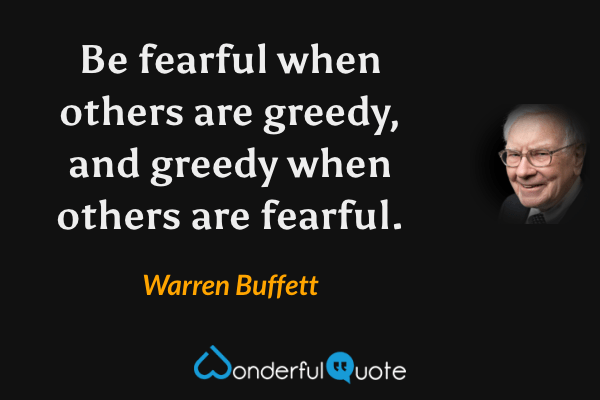
Be fearful when others are greedy, and greedy when others are fearful.
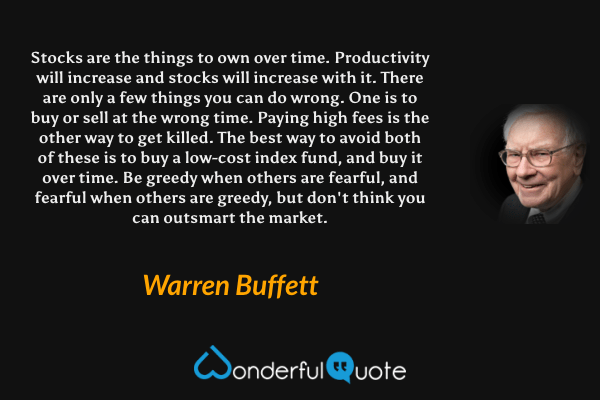
Stocks are the things to own over time. Productivity will increase and stocks will increase with it. There are only a few things you can do wrong. One is to buy or sell at the wrong time. Paying high fees is the other way to get killed. The best way to avoid both of these is to buy a low-cost index fund, and buy it over time. Be greedy when others are fearful, and fearful when others are greedy, but don't think you can outsmart the market.
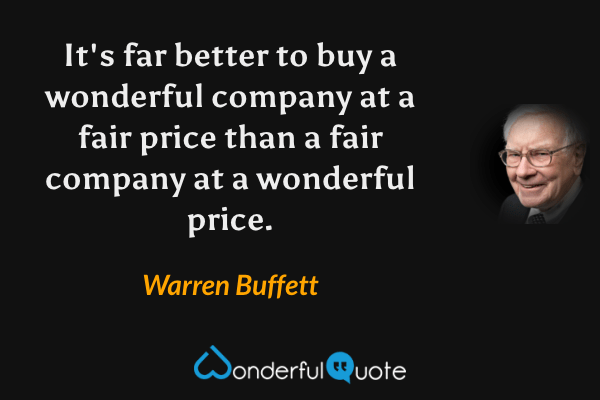
It's far better to buy a wonderful company at a fair price than a fair company at a wonderful price.
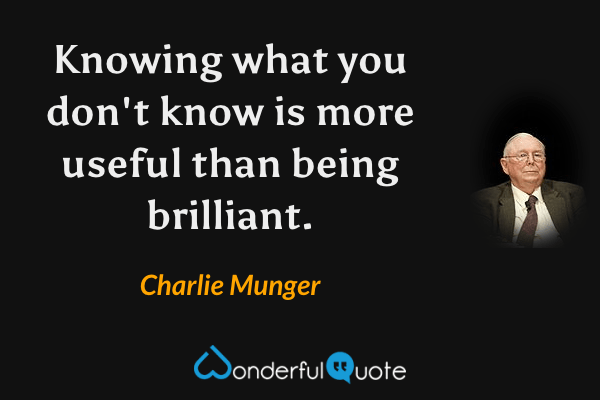
Knowing what you don't know is more useful than being brilliant.
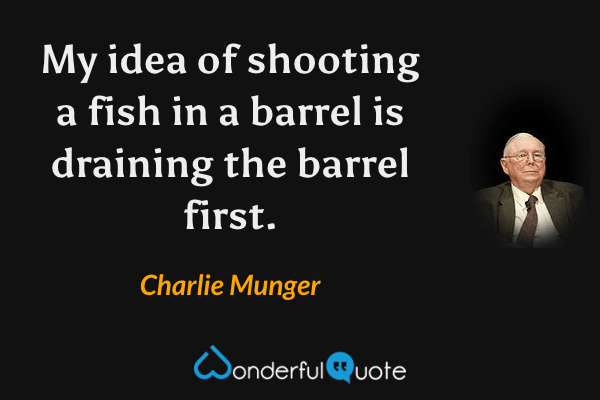
My idea of shooting a fish in a barrel is draining the barrel first.
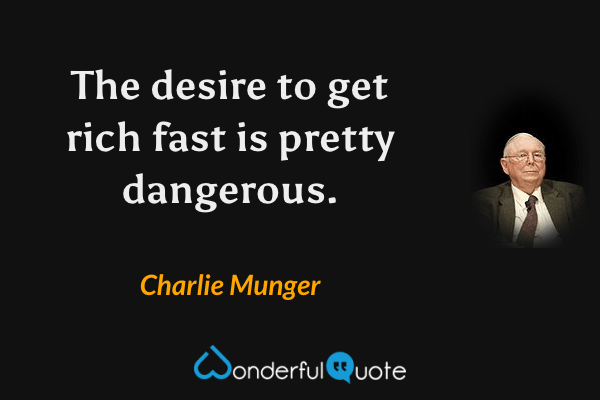
The desire to get rich fast is pretty dangerous.
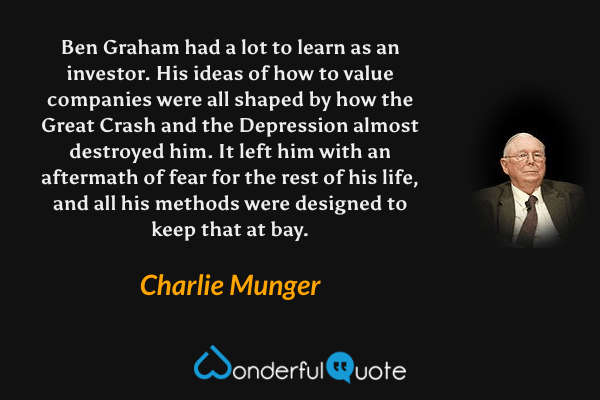
Ben Graham had a lot to learn as an investor. His ideas of how to value companies were all shaped by how the Great Crash and the Depression almost destroyed him. It left him with an aftermath of fear for the rest of his life, and all his methods were designed to keep that at bay.
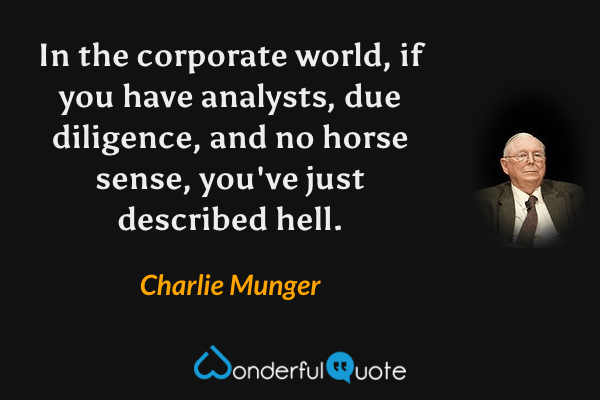
In the corporate world, if you have analysts, due diligence, and no horse sense, you've just described hell.
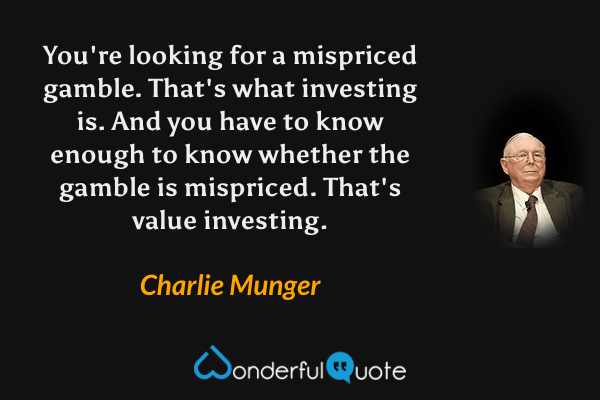
You're looking for a mispriced gamble. That's what investing is. And you have to know enough to know whether the gamble is mispriced. That's value investing.
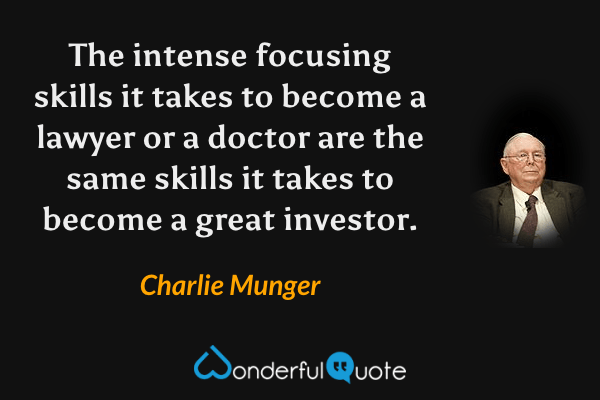
The intense focusing skills it takes to become a lawyer or a doctor are the same skills it takes to become a great investor.
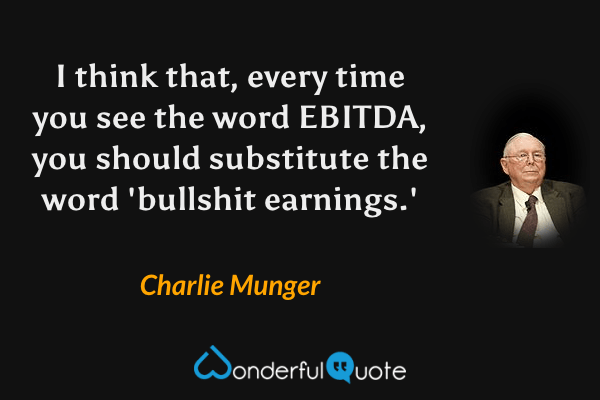
I think that, every time you see the word EBITDA, you should substitute the word 'bullshit earnings.'
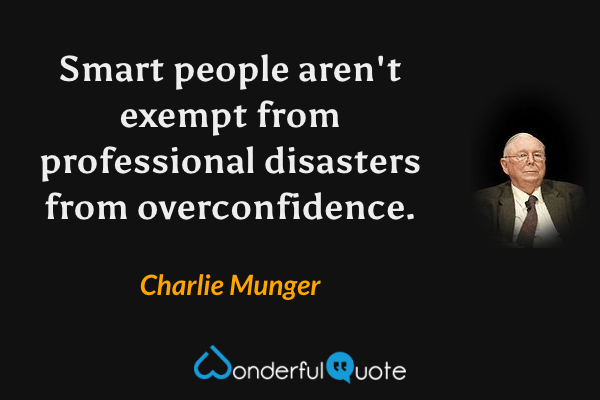
Smart people aren't exempt from professional disasters from overconfidence.

There is more dementia about finance than there is about sex.
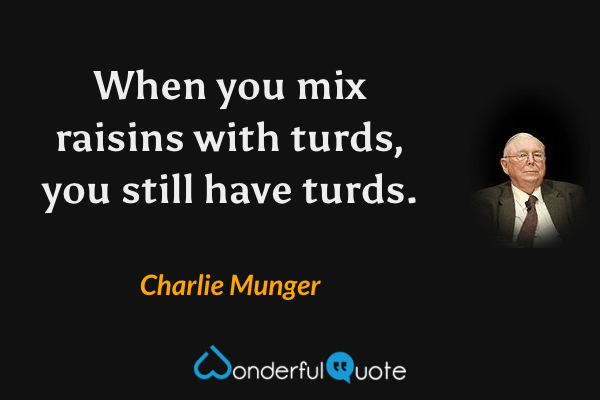
When you mix raisins with turds, you still have turds.
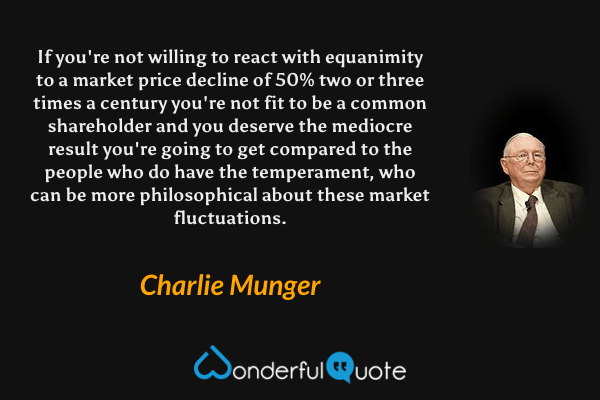
If you're not willing to react with equanimity to a market price decline of 50% two or three times a century you're not fit to be a common shareholder and you deserve the mediocre result you're going to get compared to the people who do have the temperament, who can be more philosophical about these market fluctuations.
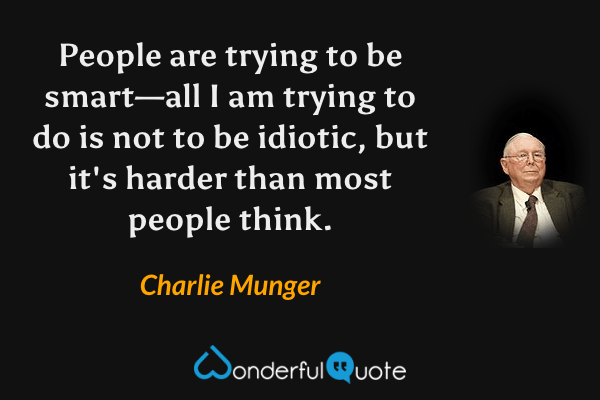
People are trying to be smart—all I am trying to do is not to be idiotic, but it's harder than most people think.
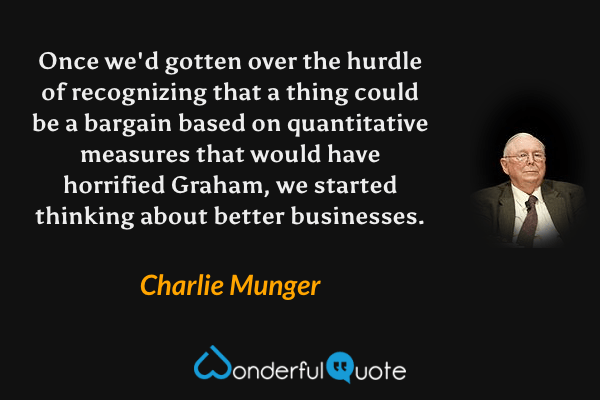
Once we'd gotten over the hurdle of recognizing that a thing could be a bargain based on quantitative measures that would have horrified Graham, we started thinking about better businesses.
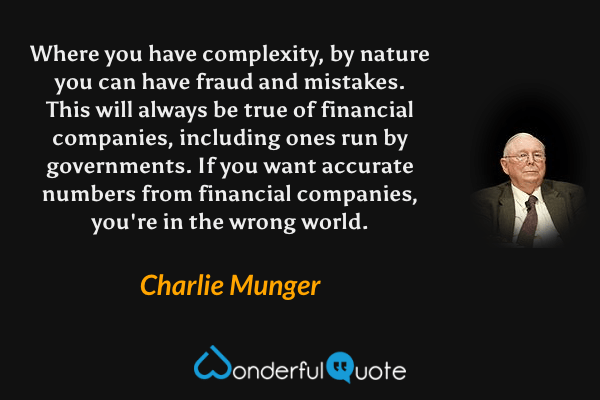
Where you have complexity, by nature you can have fraud and mistakes. This will always be true of financial companies, including ones run by governments. If you want accurate numbers from financial companies, you're in the wrong world.
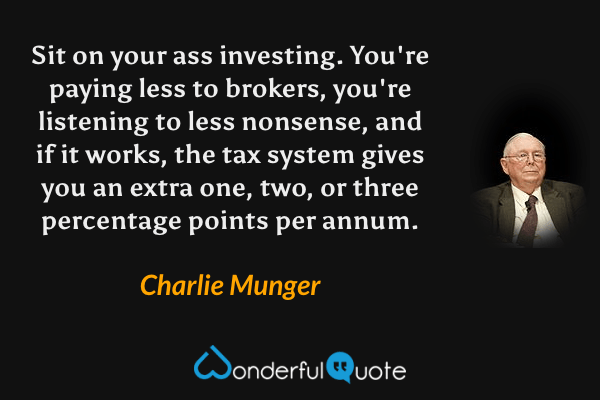
Sit on your ass investing. You're paying less to brokers, you're listening to less nonsense, and if it works, the tax system gives you an extra one, two, or three percentage points per annum.
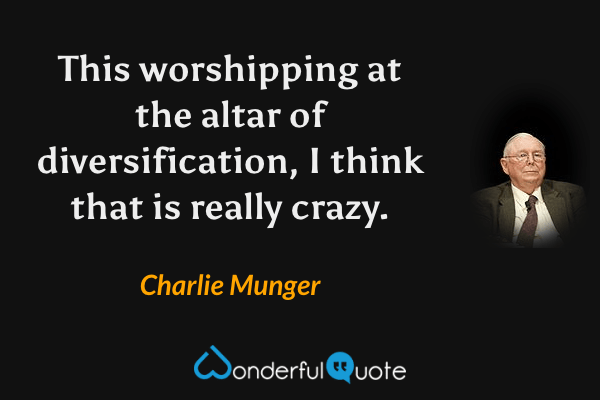
This worshipping at the altar of diversification, I think that is really crazy.
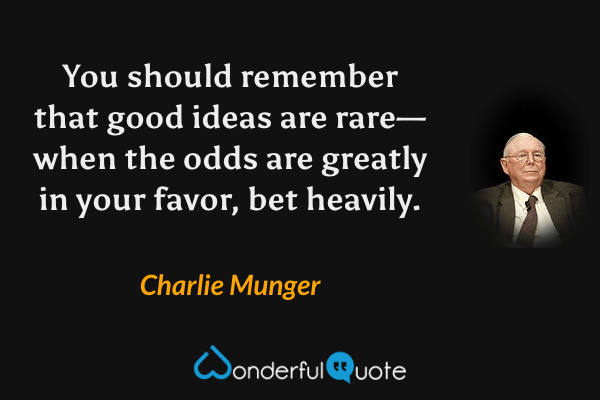
You should remember that good ideas are rare—when the odds are greatly in your favor, bet heavily.
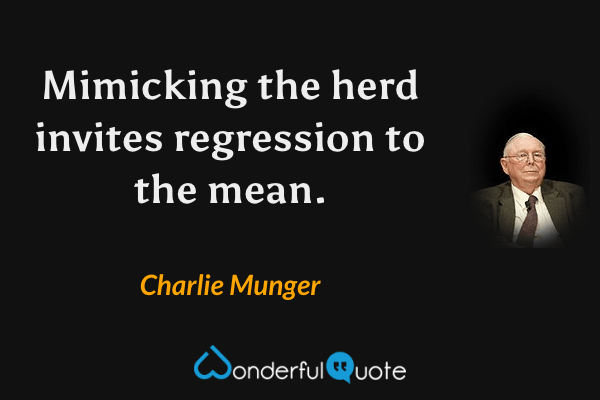
Mimicking the herd invites regression to the mean.
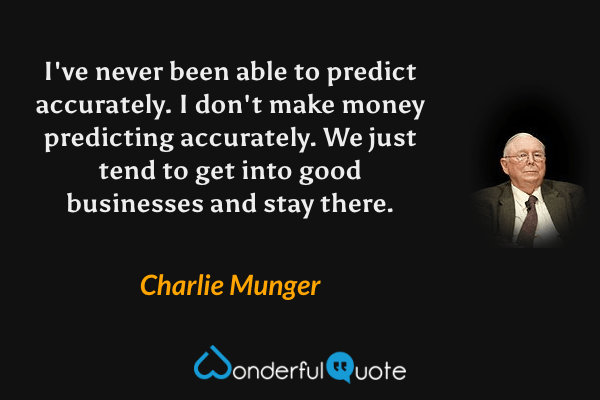
I've never been able to predict accurately. I don't make money predicting accurately. We just tend to get into good businesses and stay there.

The way to get rich is to keep $10 million in your checking account in case a good deal comes along.
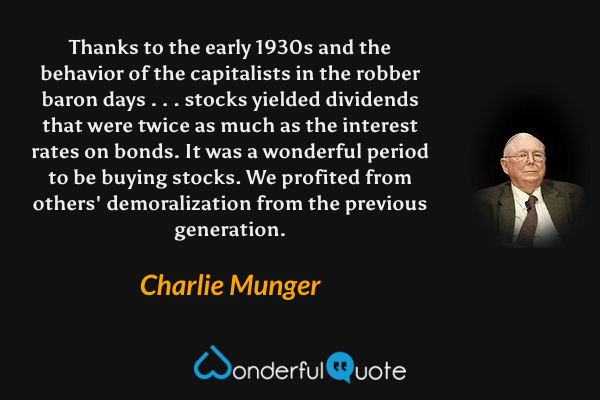
Thanks to the early 1930s and the behavior of the capitalists in the robber baron days . . . stocks yielded dividends that were twice as much as the interest rates on bonds. It was a wonderful period to be buying stocks. We profited from others' demoralization from the previous generation.
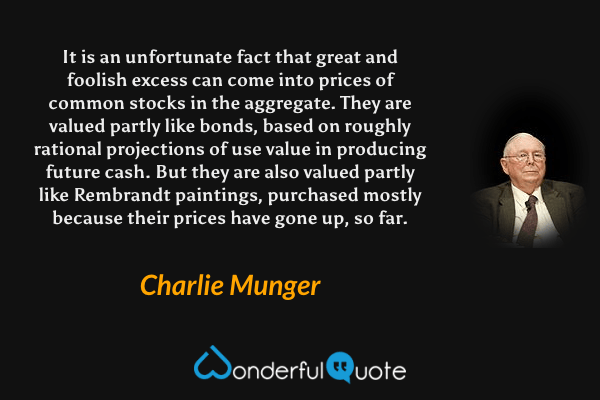
It is an unfortunate fact that great and foolish excess can come into prices of common stocks in the aggregate. They are valued partly like bonds, based on roughly rational projections of use value in producing future cash. But they are also valued partly like Rembrandt paintings, purchased mostly because their prices have gone up, so far.
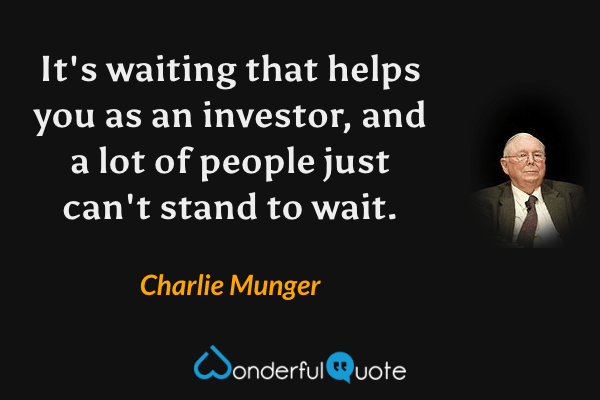
It's waiting that helps you as an investor, and a lot of people just can't stand to wait.
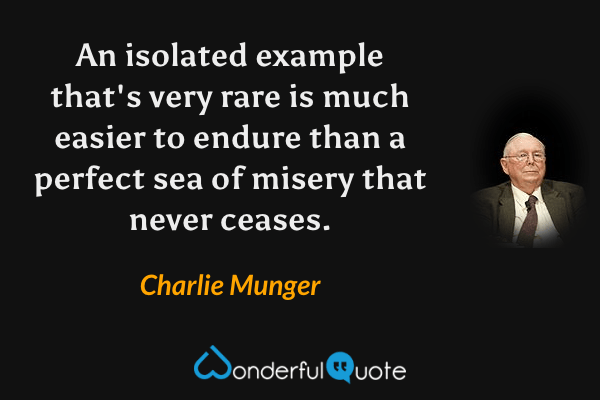
An isolated example that's very rare is much easier to endure than a perfect sea of misery that never ceases.
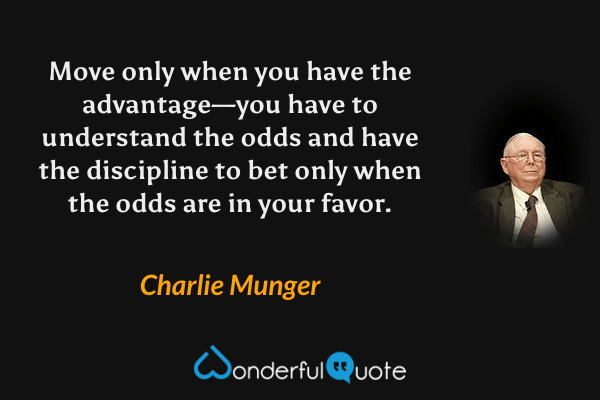
Move only when you have the advantage—you have to understand the odds and have the discipline to bet only when the odds are in your favor.
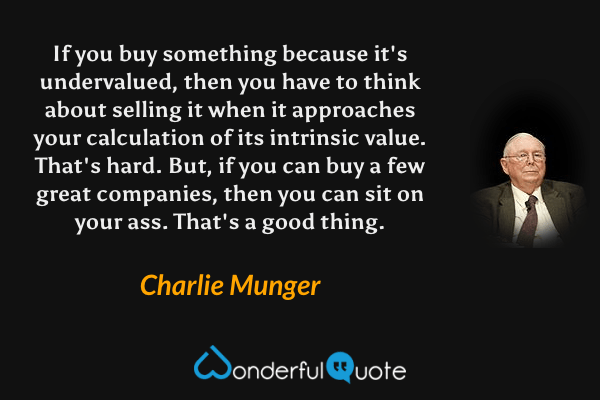
If you buy something because it's undervalued, then you have to think about selling it when it approaches your calculation of its intrinsic value. That's hard. But, if you can buy a few great companies, then you can sit on your ass. That's a good thing.
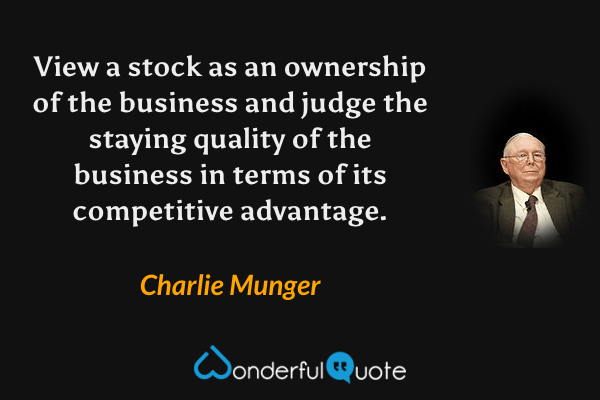
View a stock as an ownership of the business and judge the staying quality of the business in terms of its competitive advantage.
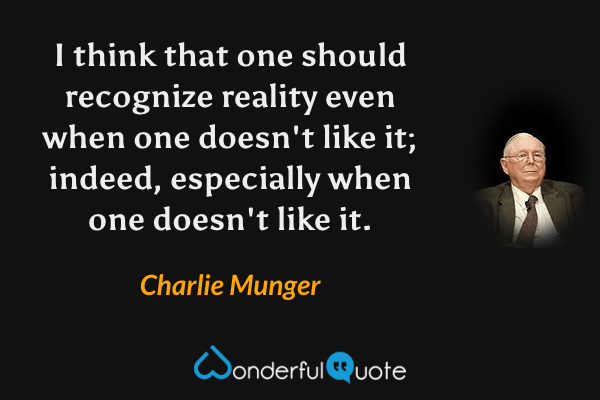
I think that one should recognize reality even when one doesn't like it; indeed, especially when one doesn't like it.
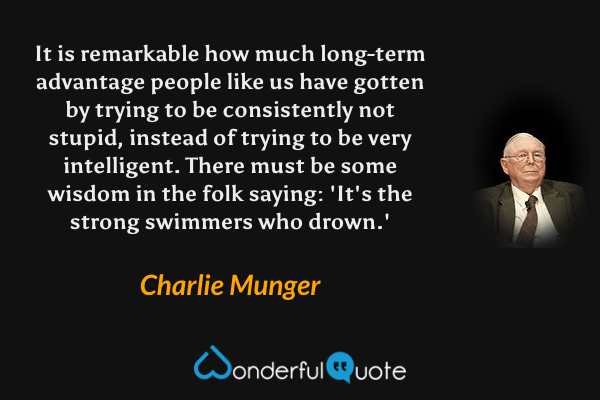
It is remarkable how much long-term advantage people like us have gotten by trying to be consistently not stupid, instead of trying to be very intelligent. There must be some wisdom in the folk saying: 'It's the strong swimmers who drown.'
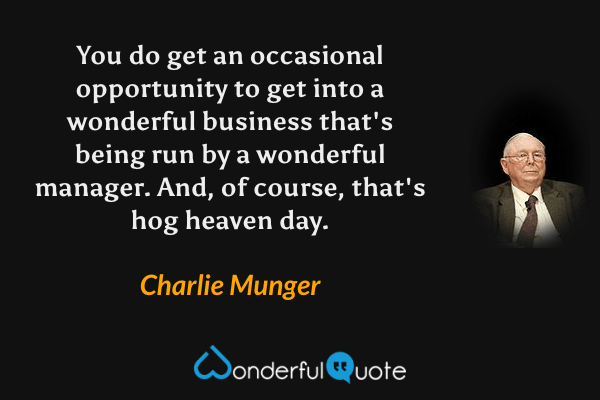
You do get an occasional opportunity to get into a wonderful business that's being run by a wonderful manager. And, of course, that's hog heaven day.

When I came out to California, there was this playboy and he spent all his time drinking heavily and chasing movie stars. His banker called him in and said that he was very nervous about his behavior. He told his banker, 'Let me tell you something: my municipal bonds don't drink.'
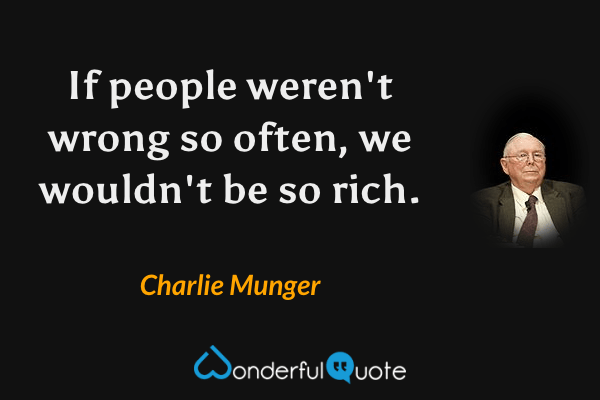
If people weren't wrong so often, we wouldn't be so rich.
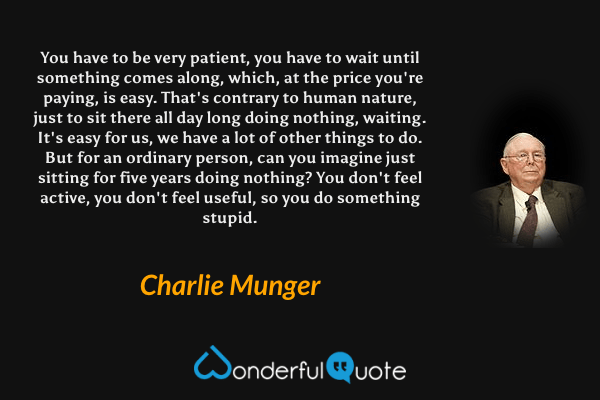
You have to be very patient, you have to wait until something comes along, which, at the price you're paying, is easy. That's contrary to human nature, just to sit there all day long doing nothing, waiting. It's easy for us, we have a lot of other things to do. But for an ordinary person, can you imagine just sitting for five years doing nothing? You don't feel active, you don't feel useful, so you do something stupid.
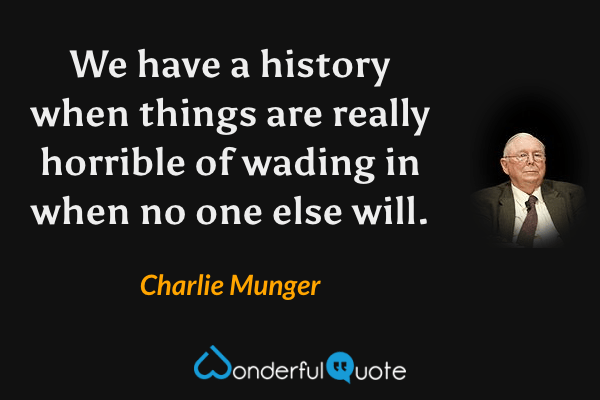
We have a history when things are really horrible of wading in when no one else will.
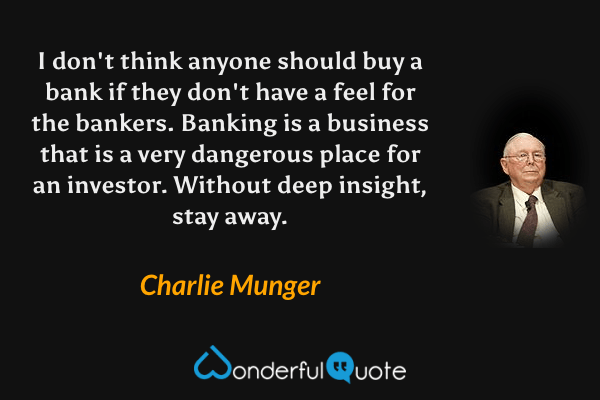
I don't think anyone should buy a bank if they don't have a feel for the bankers. Banking is a business that is a very dangerous place for an investor. Without deep insight, stay away.
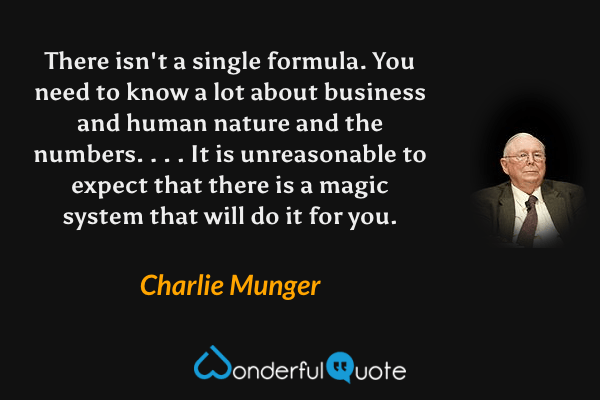
There isn't a single formula. You need to know a lot about business and human nature and the numbers. . . . It is unreasonable to expect that there is a magic system that will do it for you.
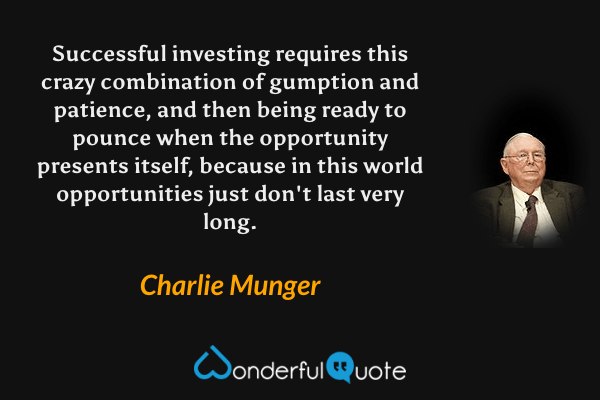
Successful investing requires this crazy combination of gumption and patience, and then being ready to pounce when the opportunity presents itself, because in this world opportunities just don't last very long.
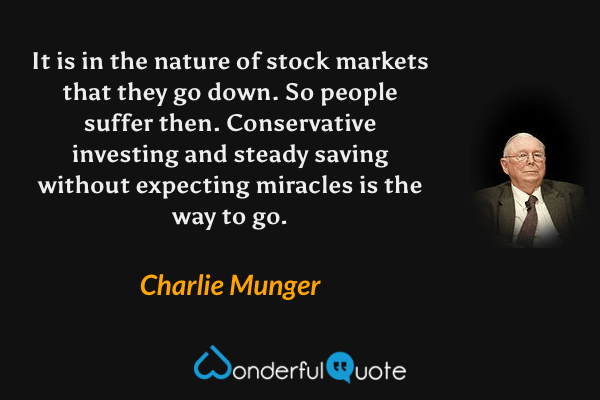
It is in the nature of stock markets that they go down. So people suffer then. Conservative investing and steady saving without expecting miracles is the way to go.
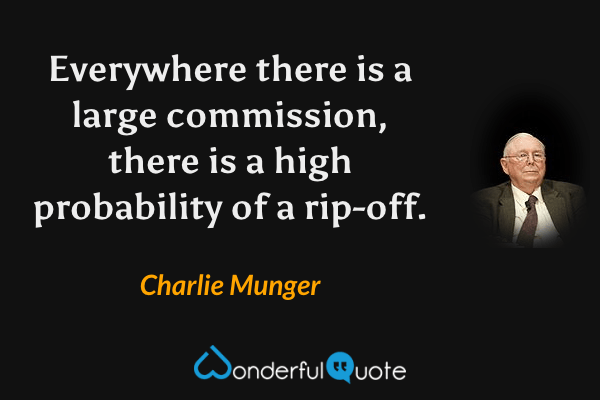
Everywhere there is a large commission, there is a high probability of a rip-off.
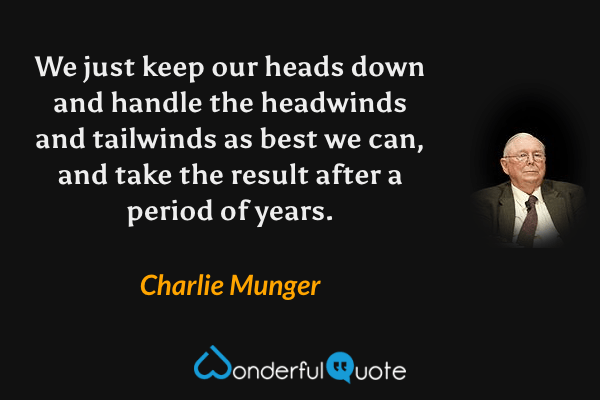
We just keep our heads down and handle the headwinds and tailwinds as best we can, and take the result after a period of years.
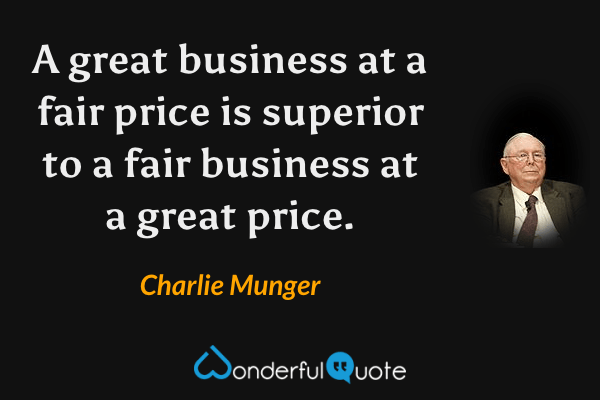
A great business at a fair price is superior to a fair business at a great price.
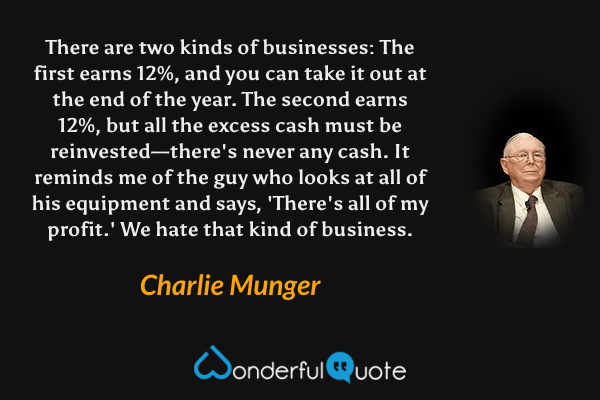
There are two kinds of businesses: The first earns 12%, and you can take it out at the end of the year. The second earns 12%, but all the excess cash must be reinvested—there's never any cash. It reminds me of the guy who looks at all of his equipment and says, 'There's all of my profit.' We hate that kind of business.
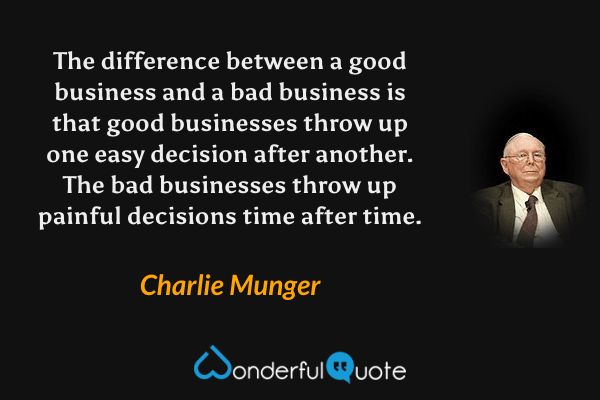
The difference between a good business and a bad business is that good businesses throw up one easy decision after another. The bad businesses throw up painful decisions time after time.
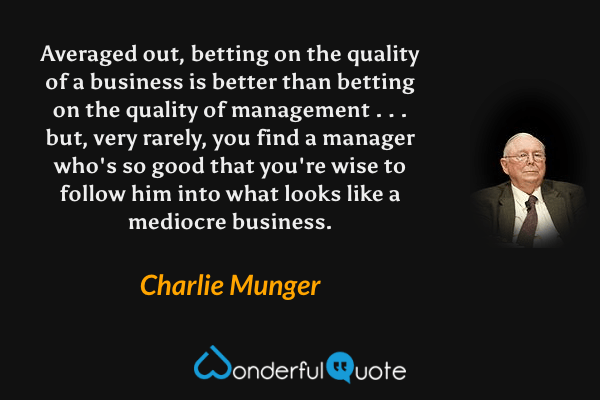
Averaged out, betting on the quality of a business is better than betting on the quality of management . . . but, very rarely, you find a manager who's so good that you're wise to follow him into what looks like a mediocre business.
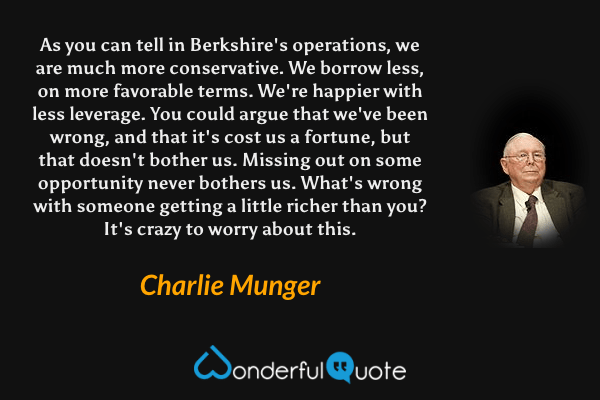
As you can tell in Berkshire's operations, we are much more conservative. We borrow less, on more favorable terms. We're happier with less leverage. You could argue that we've been wrong, and that it's cost us a fortune, but that doesn't bother us. Missing out on some opportunity never bothers us. What's wrong with someone getting a little richer than you? It's crazy to worry about this.
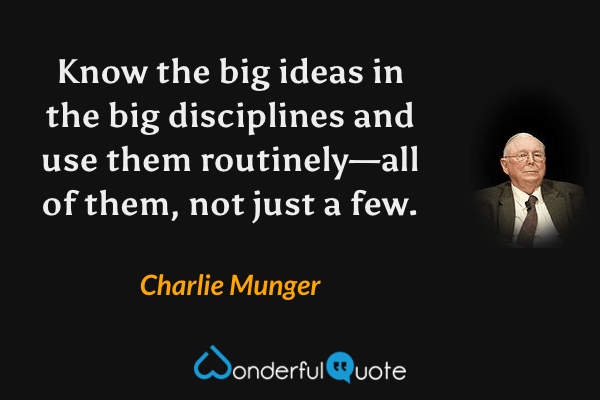
Know the big ideas in the big disciplines and use them routinely—all of them, not just a few.
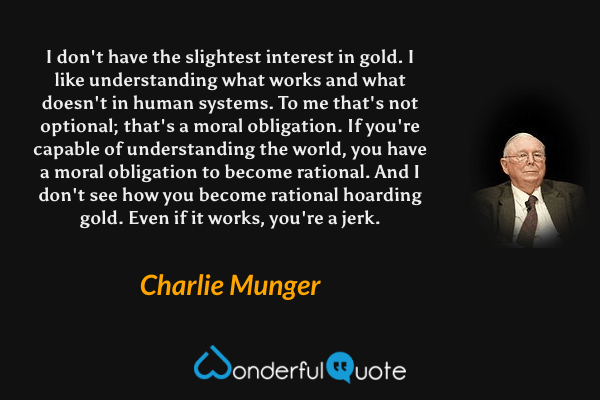
I don't have the slightest interest in gold. I like understanding what works and what doesn't in human systems. To me that's not optional; that's a moral obligation. If you're capable of understanding the world, you have a moral obligation to become rational. And I don't see how you become rational hoarding gold. Even if it works, you're a jerk.
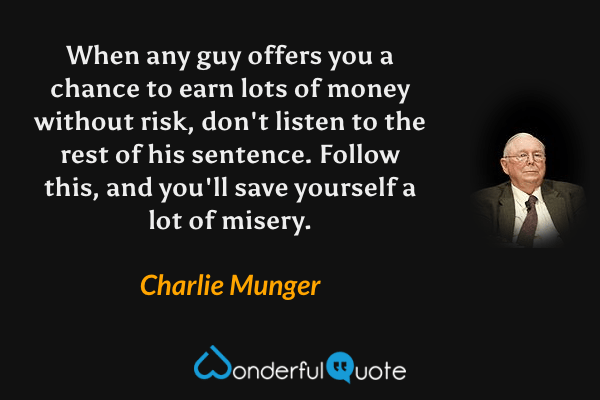
When any guy offers you a chance to earn lots of money without risk, don't listen to the rest of his sentence. Follow this, and you'll save yourself a lot of misery.
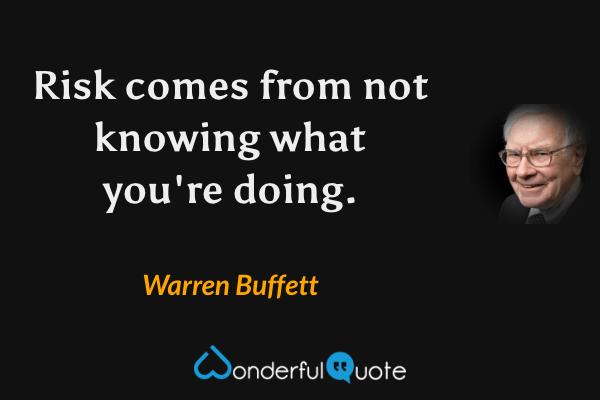
Risk comes from not knowing what you're doing.
One thing I could never abide was the leaving of money to lie idle, or even to have credit and not use it.
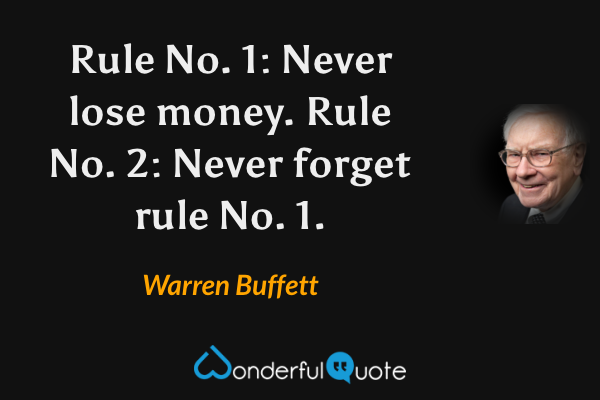
Rule No. 1: Never lose money. Rule No. 2: Never forget rule No. 1.
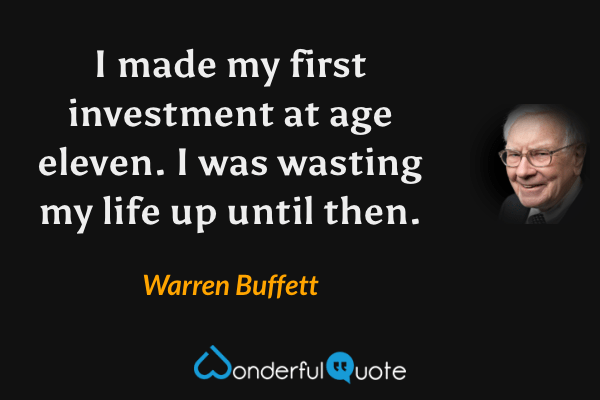
I made my first investment at age eleven. I was wasting my life up until then.
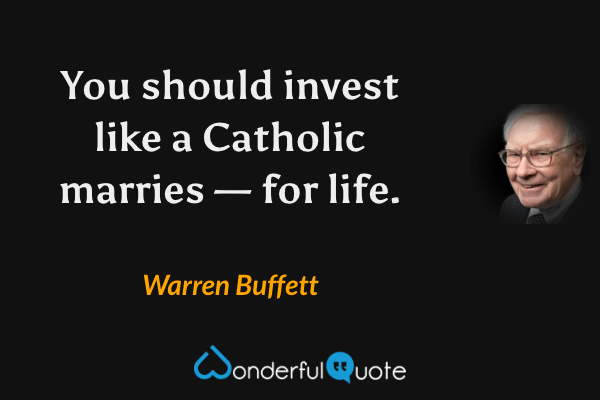
You should invest like a Catholic marries — for life.
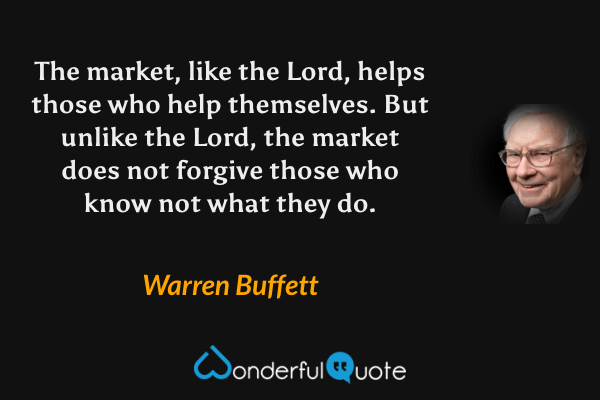
The market, like the Lord, helps those who help themselves. But unlike the Lord, the market does not forgive those who know not what they do.
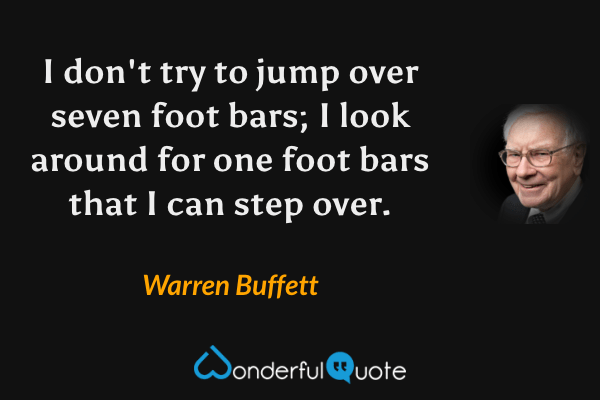
I don't try to jump over seven foot bars; I look around for one foot bars that I can step over.
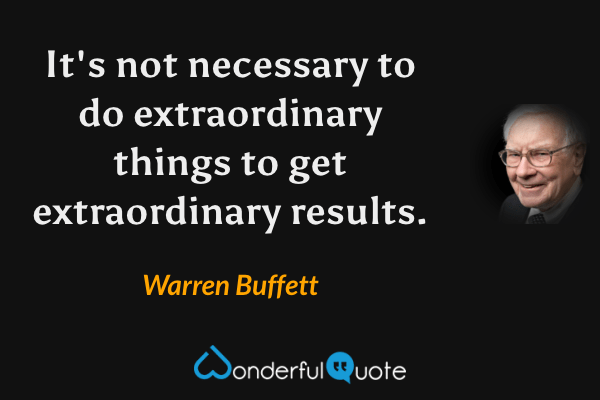
It's not necessary to do extraordinary things to get extraordinary results.
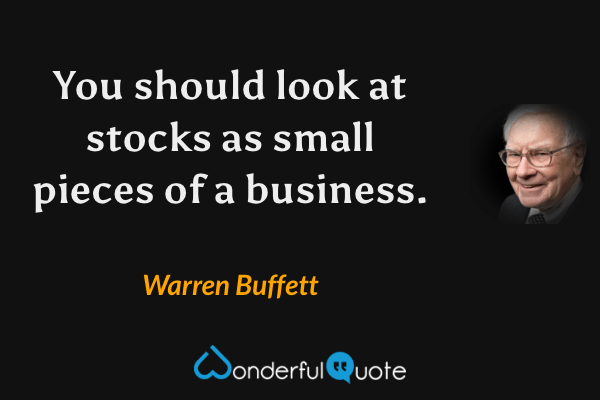
You should look at stocks as small pieces of a business.
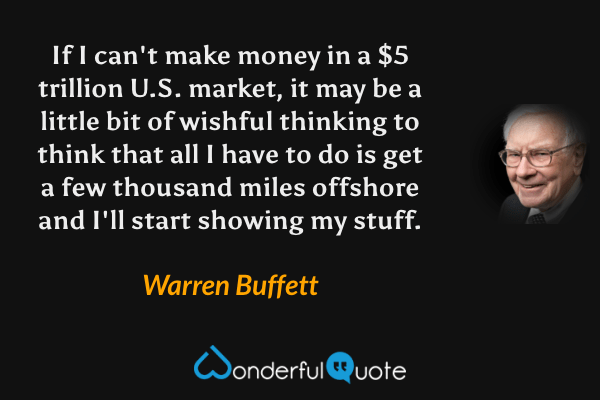
If I can't make money in a $5 trillion U.S. market, it may be a little bit of wishful thinking to think that all I have to do is get a few thousand miles offshore and I'll start showing my stuff.
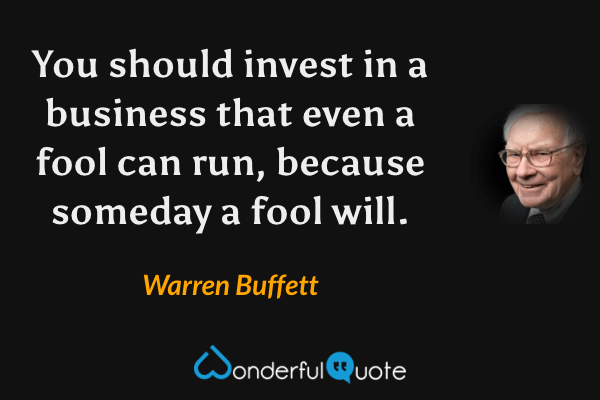
You should invest in a business that even a fool can run, because someday a fool will.
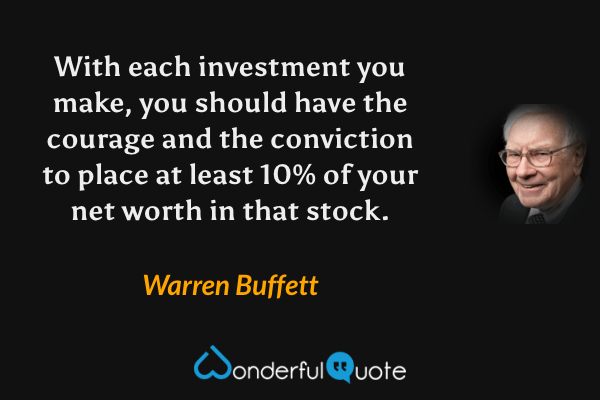
With each investment you make, you should have the courage and the conviction to place at least 10% of your net worth in that stock.
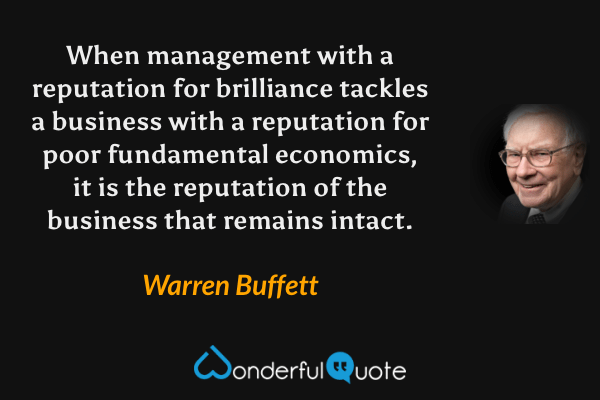
When management with a reputation for brilliance tackles a business with a reputation for poor fundamental economics, it is the reputation of the business that remains intact.
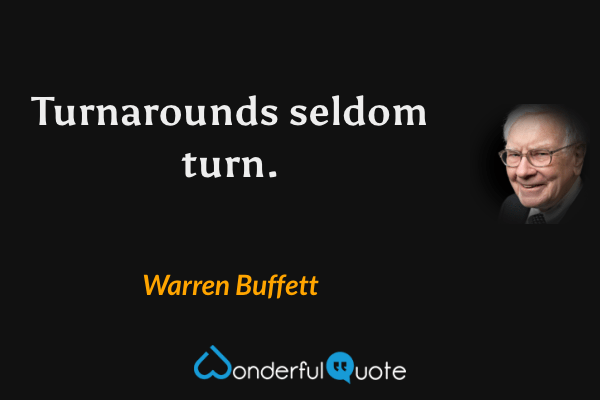
Turnarounds seldom turn.
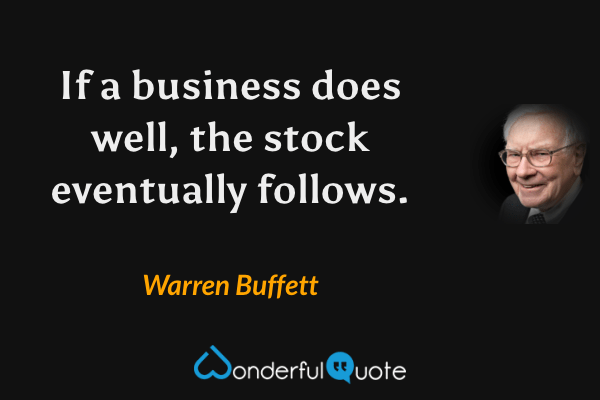
If a business does well, the stock eventually follows.
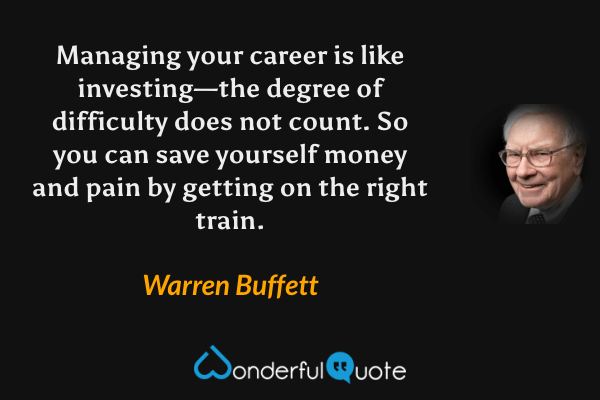
Managing your career is like investing—the degree of difficulty does not count. So you can save yourself money and pain by getting on the right train.
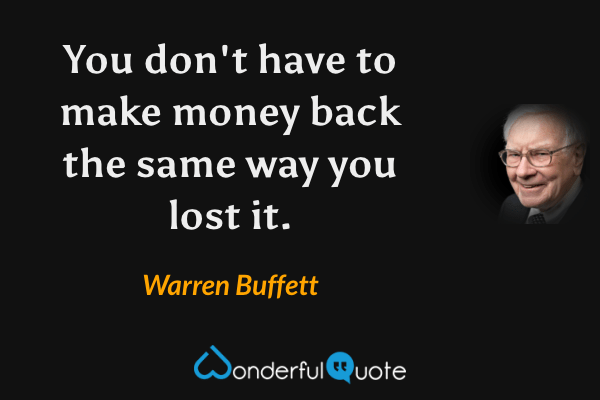
You don't have to make money back the same way you lost it.
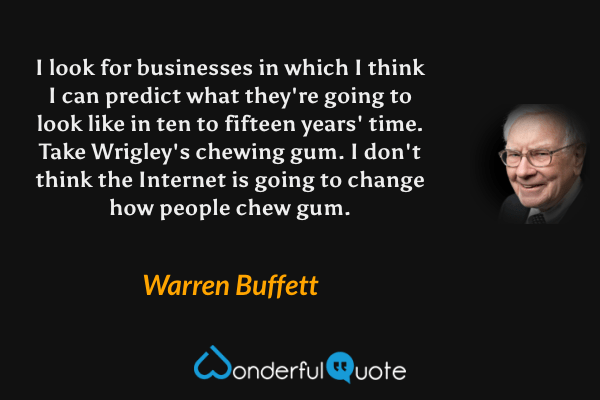
I look for businesses in which I think I can predict what they're going to look like in ten to fifteen years' time. Take Wrigley's chewing gum. I don't think the Internet is going to change how people chew gum.
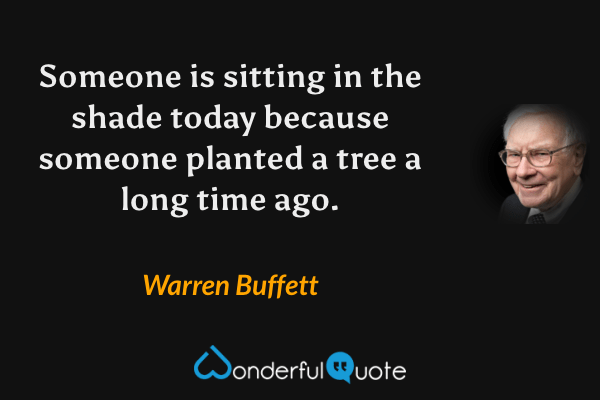
Someone is sitting in the shade today because someone planted a tree a long time ago.
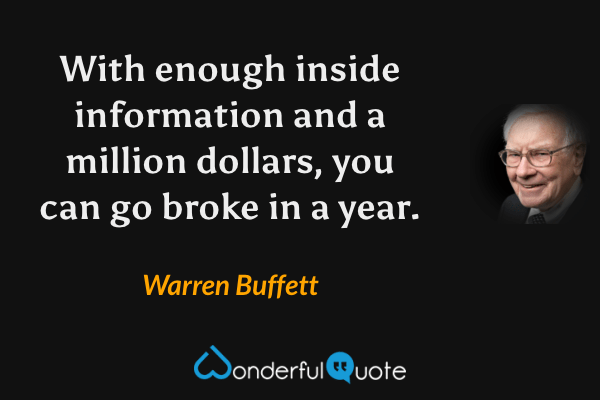
With enough inside information and a million dollars, you can go broke in a year.
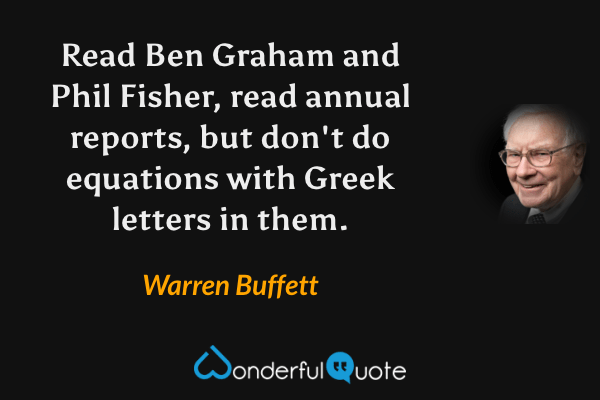
Read Ben Graham and Phil Fisher, read annual reports, but don't do equations with Greek letters in them.
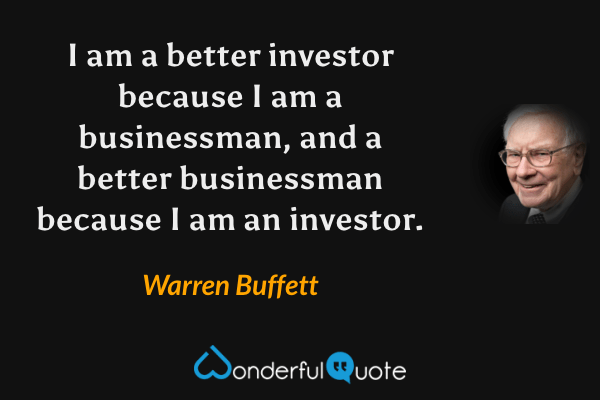
I am a better investor because I am a businessman, and a better businessman because I am an investor.
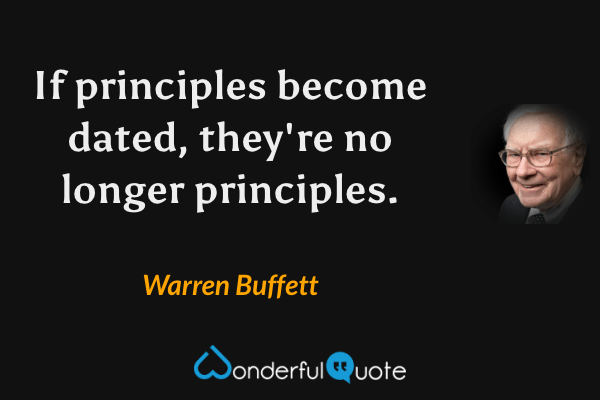
If principles become dated, they're no longer principles.
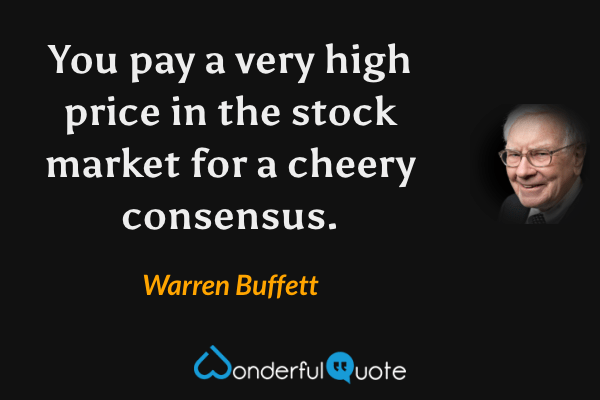
You pay a very high price in the stock market for a cheery consensus.
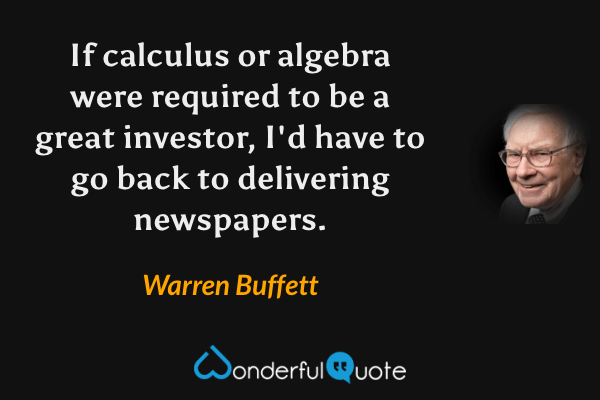
If calculus or algebra were required to be a great investor, I'd have to go back to delivering newspapers.
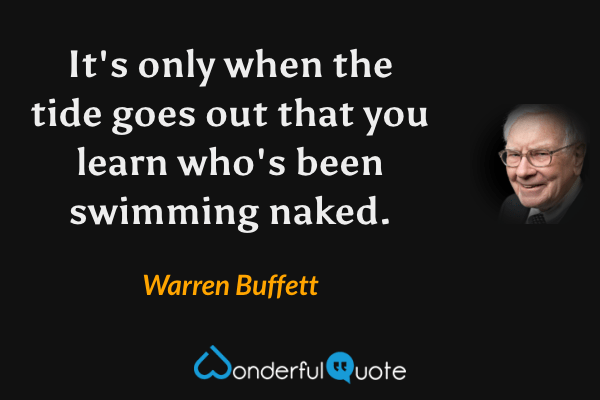
It's only when the tide goes out that you learn who's been swimming naked.
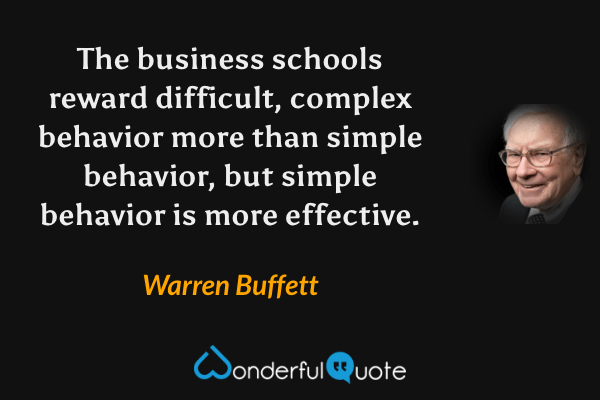
The business schools reward difficult, complex behavior more than simple behavior, but simple behavior is more effective.
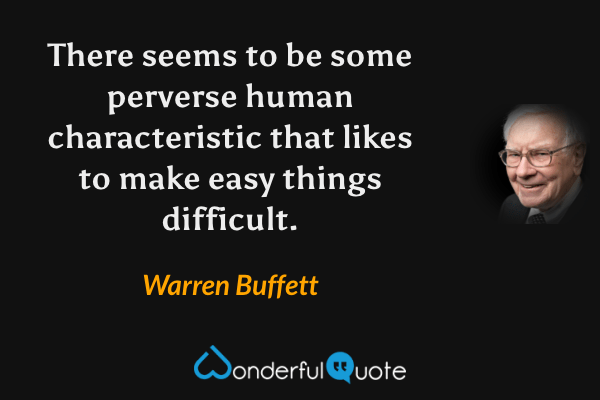
There seems to be some perverse human characteristic that likes to make easy things difficult.
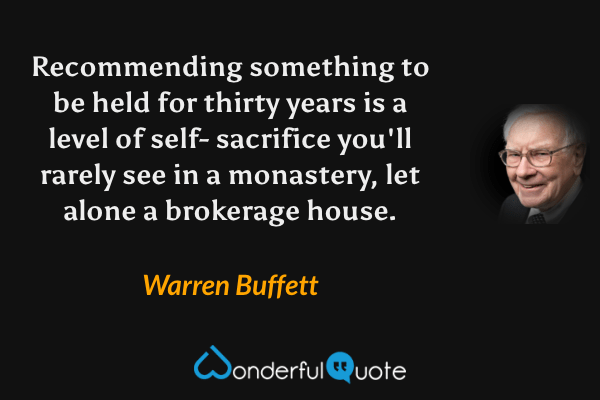
Recommending something to be held for thirty years is a level of self- sacrifice you'll rarely see in a monastery, let alone a brokerage house.
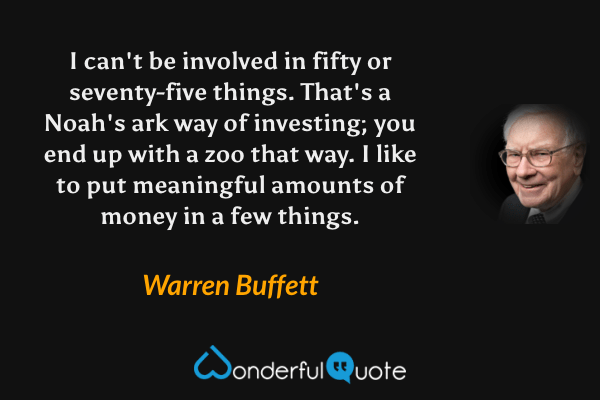
I can't be involved in fifty or seventy-five things. That's a Noah's ark way of investing; you end up with a zoo that way. I like to put meaningful amounts of money in a few things.
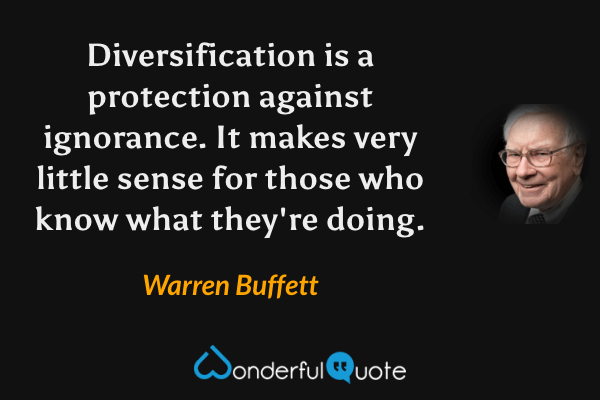
Diversification is a protection against ignorance. It makes very little sense for those who know what they're doing.
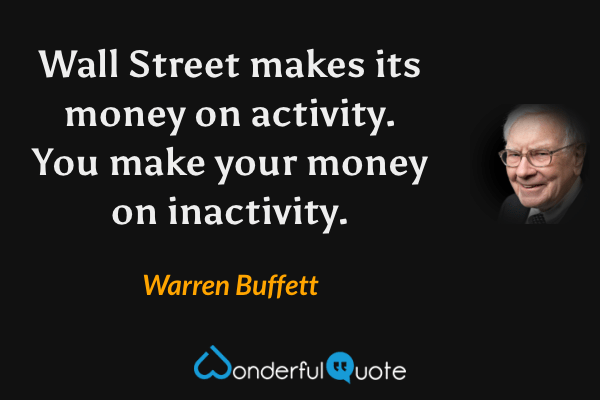
Wall Street makes its money on activity. You make your money on inactivity.
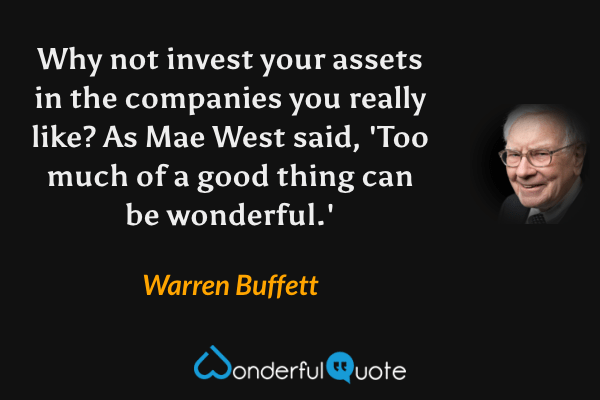
Why not invest your assets in the companies you really like? As Mae West said, 'Too much of a good thing can be wonderful.'
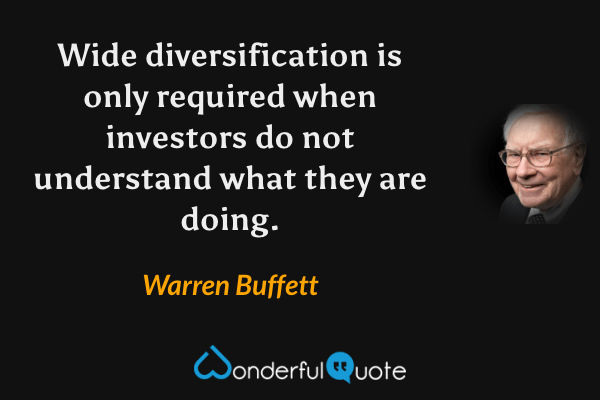
Wide diversification is only required when investors do not understand what they are doing.
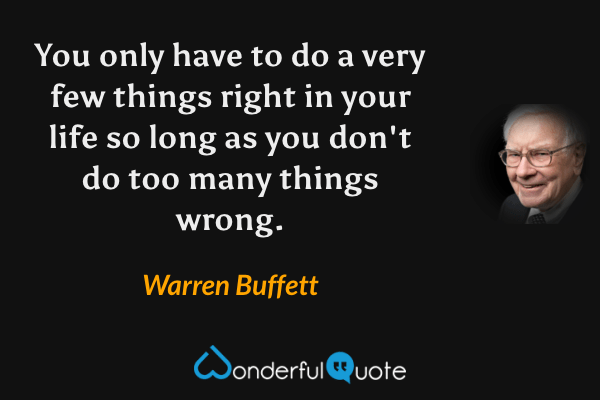
You only have to do a very few things right in your life so long as you don't do too many things wrong.
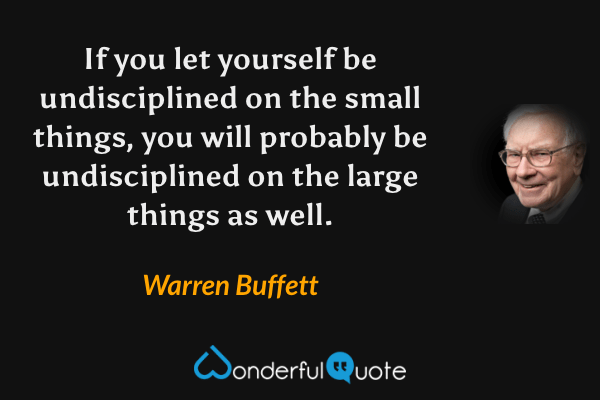
If you let yourself be undisciplined on the small things, you will probably be undisciplined on the large things as well.
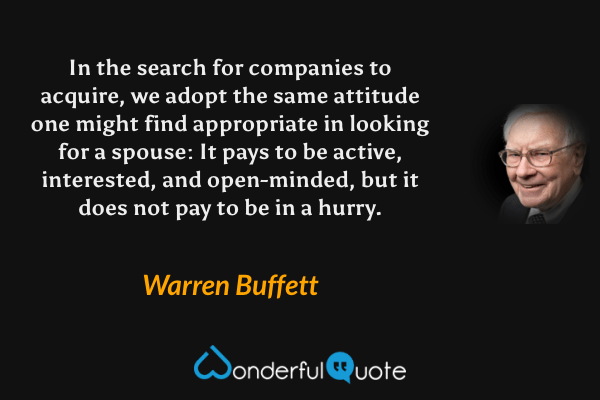
In the search for companies to acquire, we adopt the same attitude one might find appropriate in looking for a spouse: It pays to be active, interested, and open-minded, but it does not pay to be in a hurry.
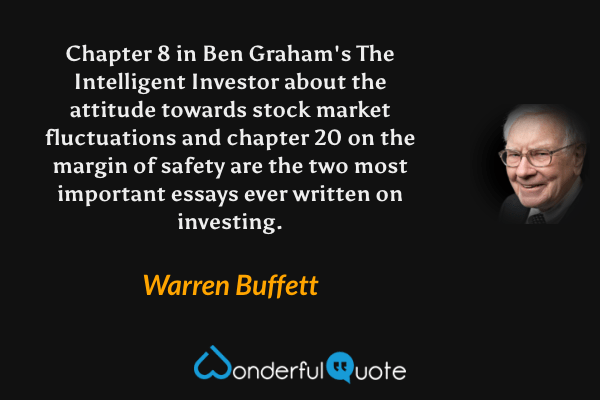
Chapter 8 in Ben Graham's The Intelligent Investor about the attitude towards stock market fluctuations and chapter 20 on the margin of safety are the two most important essays ever written on investing.
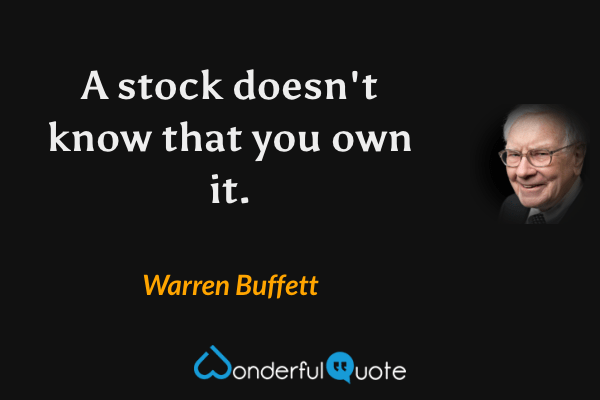
A stock doesn't know that you own it.
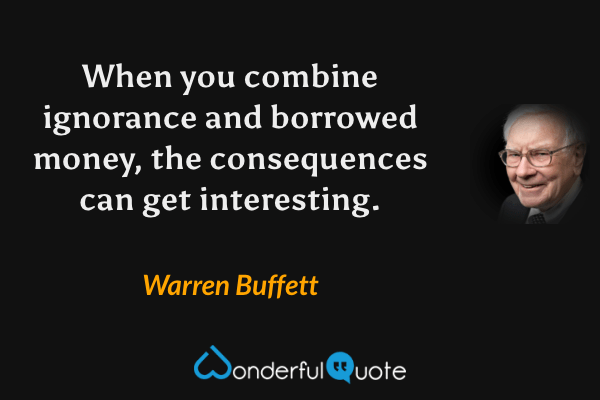
When you combine ignorance and borrowed money, the consequences can get interesting.
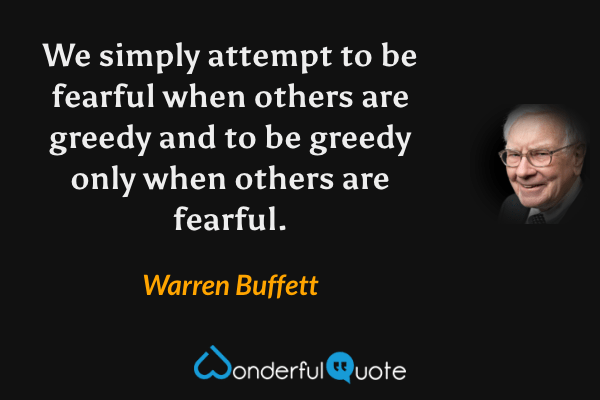
We simply attempt to be fearful when others are greedy and to be greedy only when others are fearful.
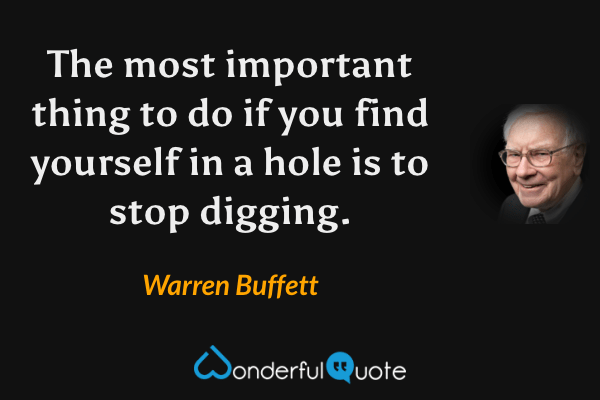
The most important thing to do if you find yourself in a hole is to stop digging.
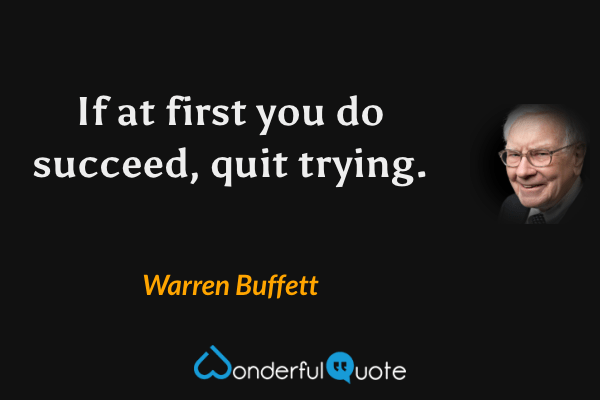
If at first you do succeed, quit trying.
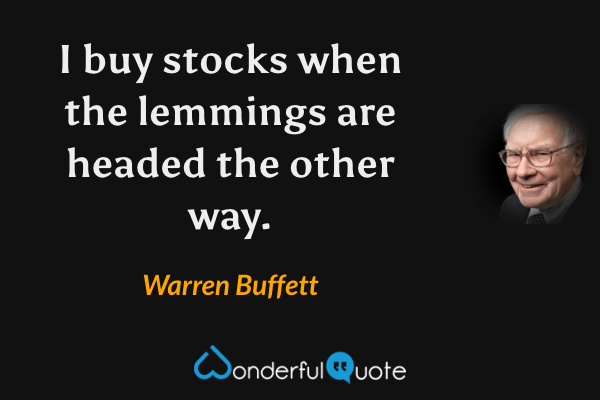
I buy stocks when the lemmings are headed the other way.
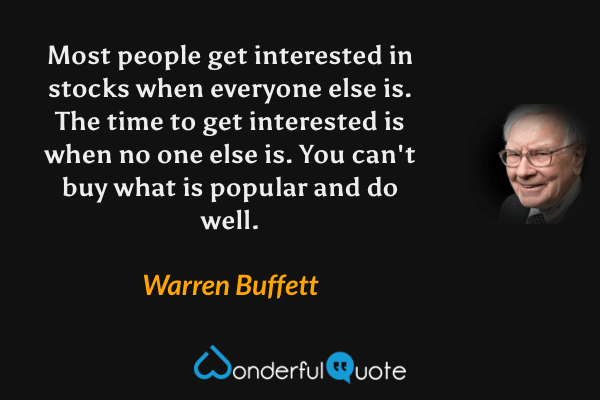
Most people get interested in stocks when everyone else is. The time to get interested is when no one else is. You can't buy what is popular and do well.
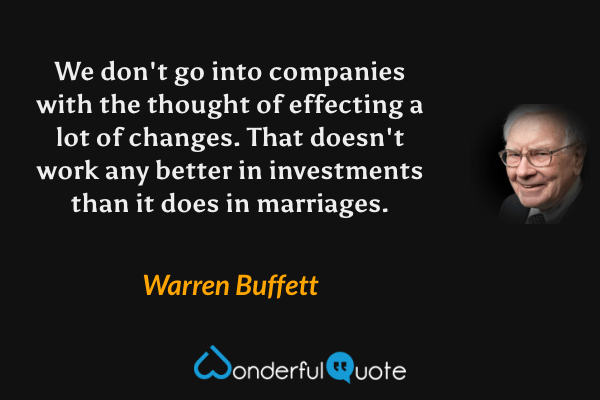
We don't go into companies with the thought of effecting a lot of changes. That doesn't work any better in investments than it does in marriages.
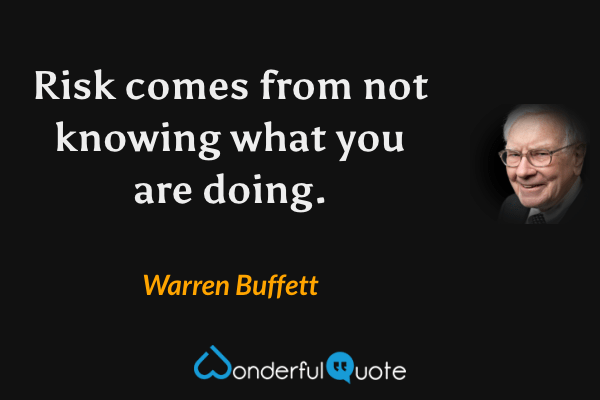
Risk comes from not knowing what you are doing.
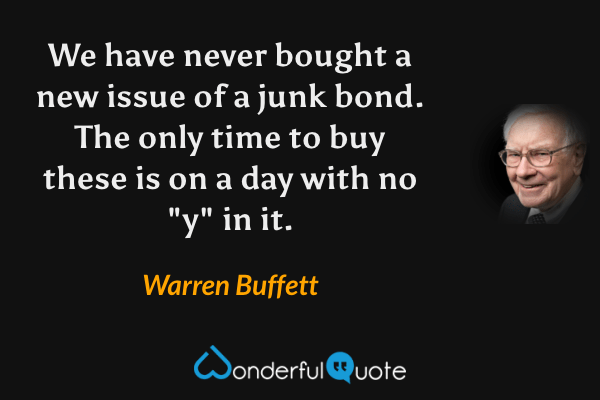
We have never bought a new issue of a junk bond. The only time to buy these is on a day with no "y" in it.
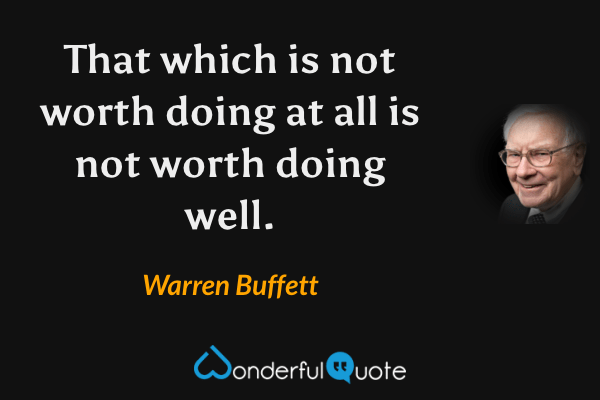
That which is not worth doing at all is not worth doing well.
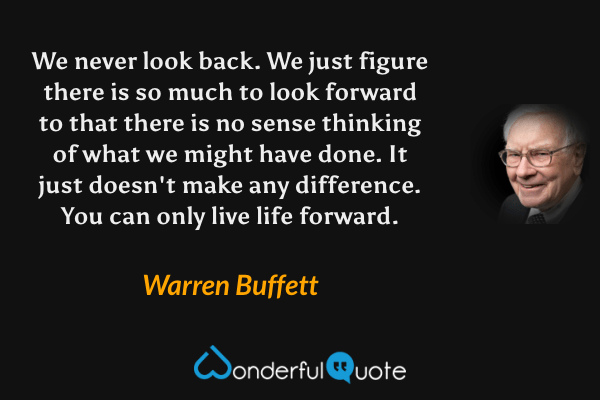
We never look back. We just figure there is so much to look forward to that there is no sense thinking of what we might have done. It just doesn't make any difference. You can only live life forward.
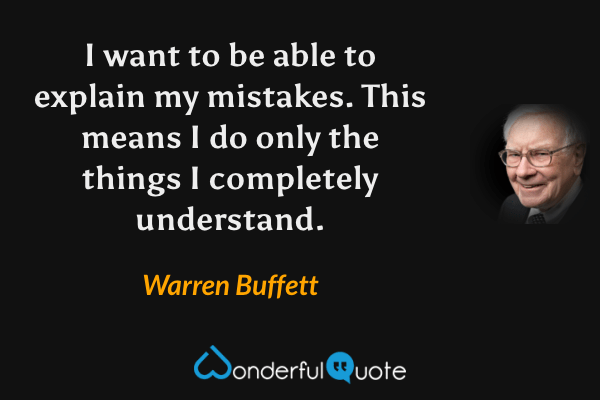
I want to be able to explain my mistakes. This means I do only the things I completely understand.
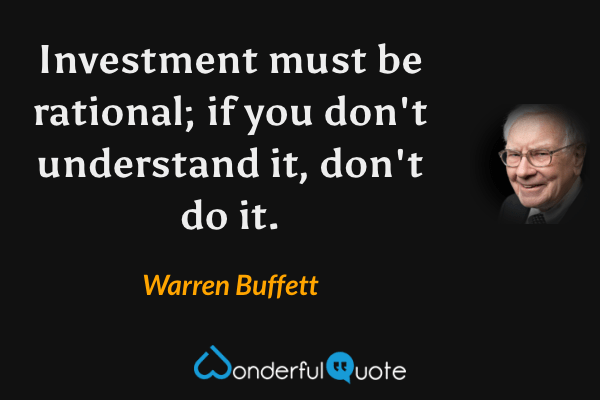
Investment must be rational; if you don't understand it, don't do it.
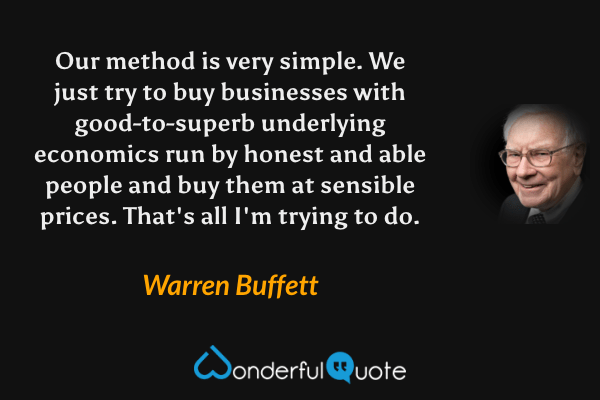
Our method is very simple. We just try to buy businesses with good-to-superb underlying economics run by honest and able people and buy them at sensible prices. That's all I'm trying to do.
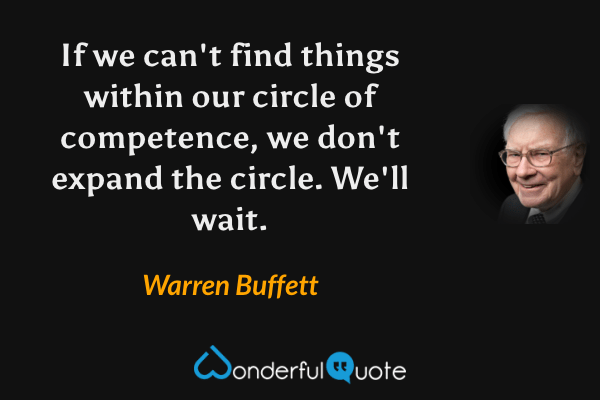
If we can't find things within our circle of competence, we don't expand the circle. We'll wait.
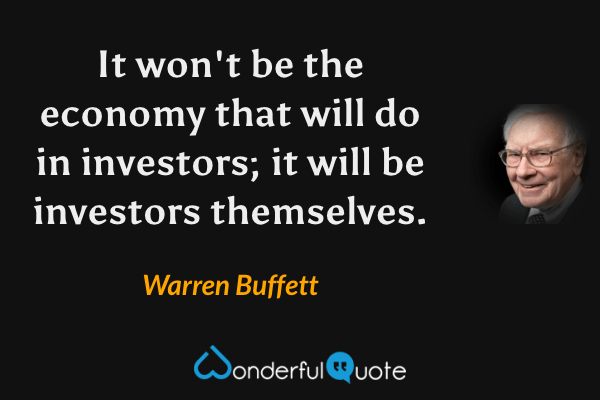
It won't be the economy that will do in investors; it will be investors themselves.
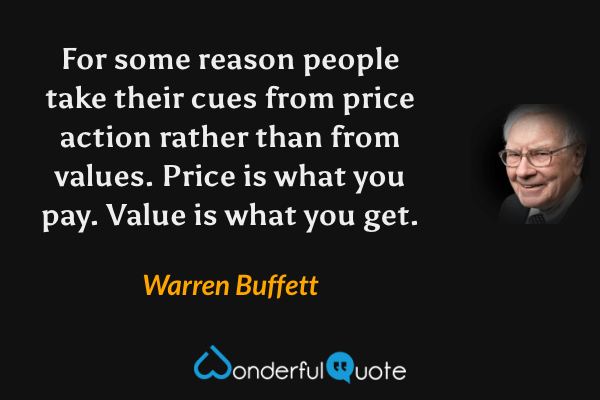
For some reason people take their cues from price action rather than from values. Price is what you pay. Value is what you get.
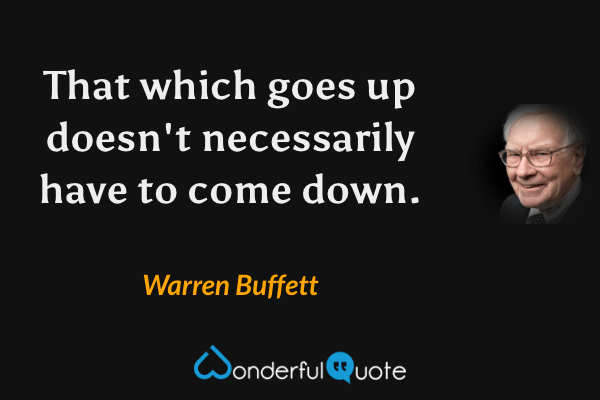
That which goes up doesn't necessarily have to come down.
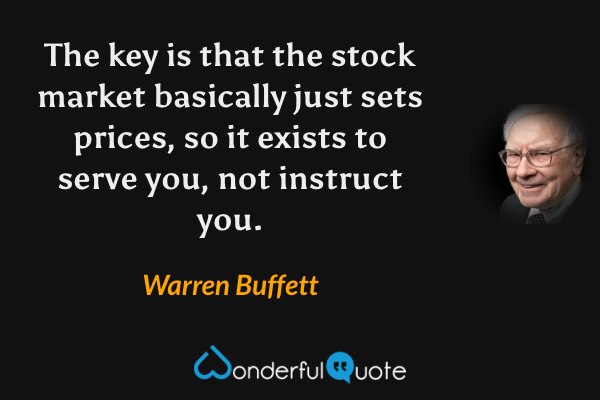
The key is that the stock market basically just sets prices, so it exists to serve you, not instruct you.
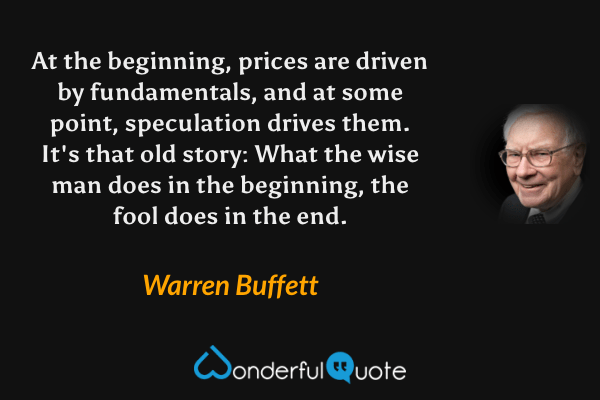
At the beginning, prices are driven by fundamentals, and at some point, speculation drives them. It's that old story: What the wise man does in the beginning, the fool does in the end.
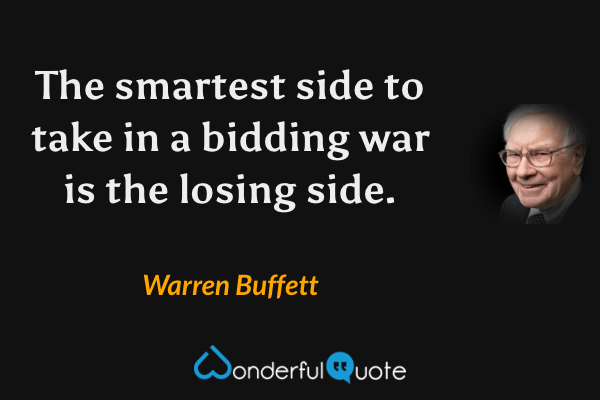
The smartest side to take in a bidding war is the losing side.
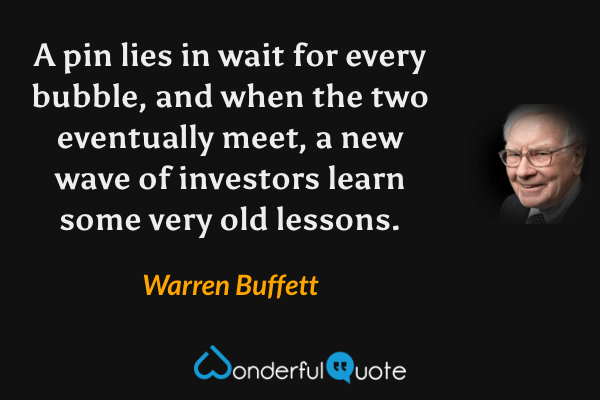
A pin lies in wait for every bubble, and when the two eventually meet, a new wave of investors learn some very old lessons.
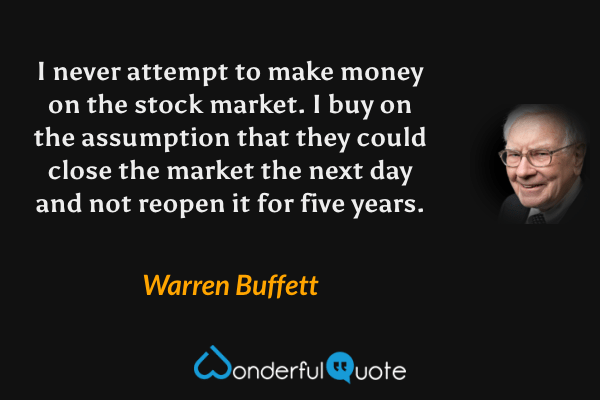
I never attempt to make money on the stock market. I buy on the assumption that they could close the market the next day and not reopen it for five years.
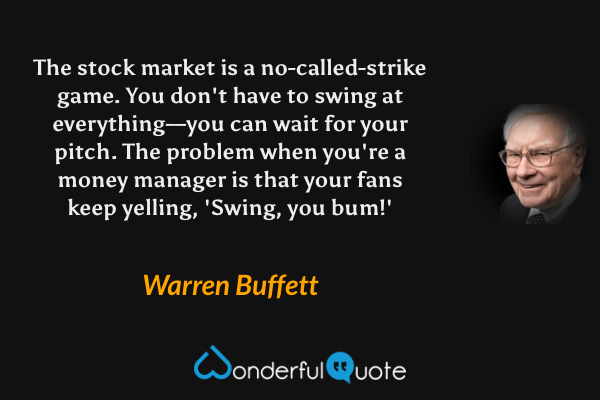
The stock market is a no-called-strike game. You don't have to swing at everything—you can wait for your pitch. The problem when you're a money manager is that your fans keep yelling, 'Swing, you bum!'
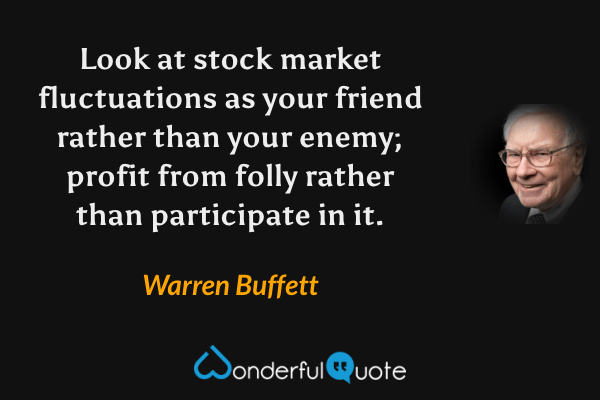
Look at stock market fluctuations as your friend rather than your enemy; profit from folly rather than participate in it.
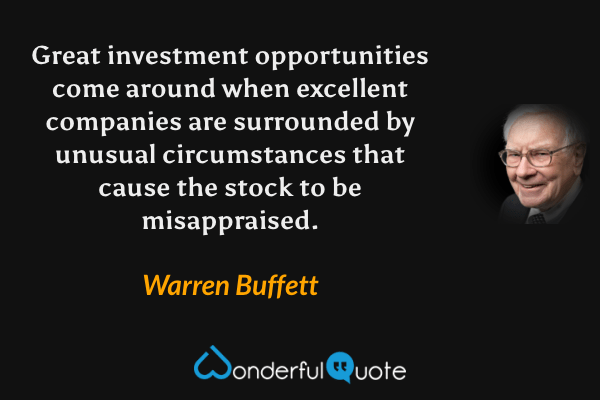
Great investment opportunities come around when excellent companies are surrounded by unusual circumstances that cause the stock to be misappraised.
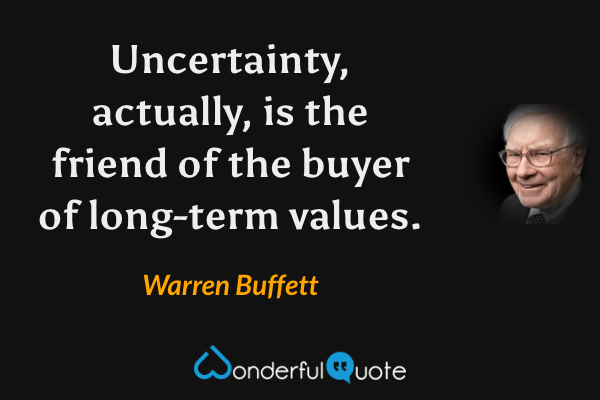
Uncertainty, actually, is the friend of the buyer of long-term values.
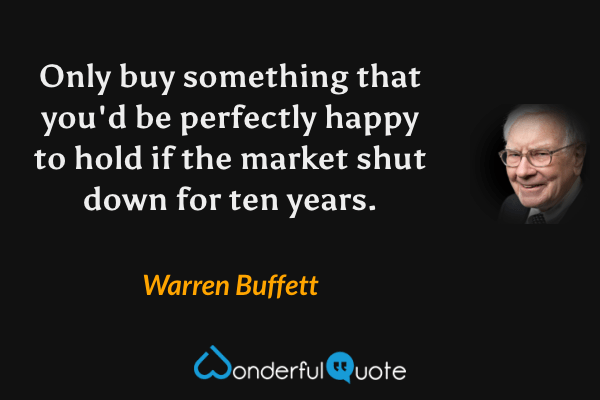
Only buy something that you'd be perfectly happy to hold if the market shut down for ten years.
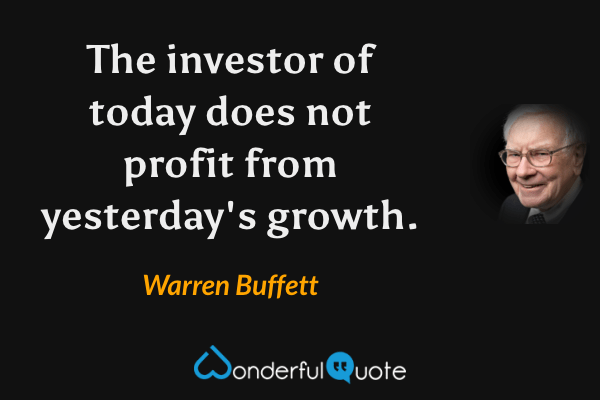
The investor of today does not profit from yesterday's growth.
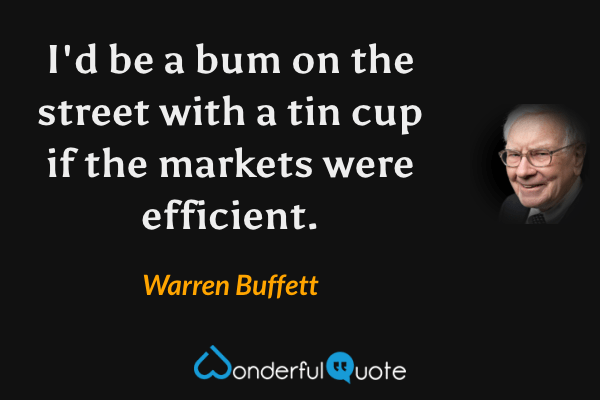
I'd be a bum on the street with a tin cup if the markets were efficient.
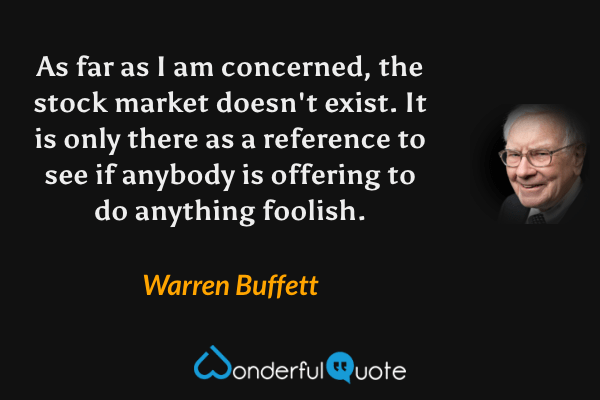
As far as I am concerned, the stock market doesn't exist. It is only there as a reference to see if anybody is offering to do anything foolish.
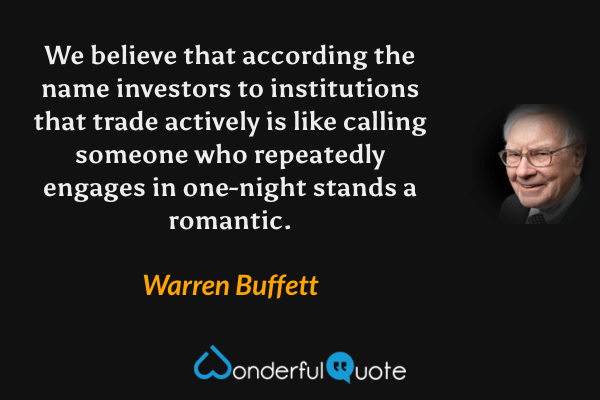
We believe that according the name investors to institutions that trade actively is like calling someone who repeatedly engages in one-night stands a romantic.
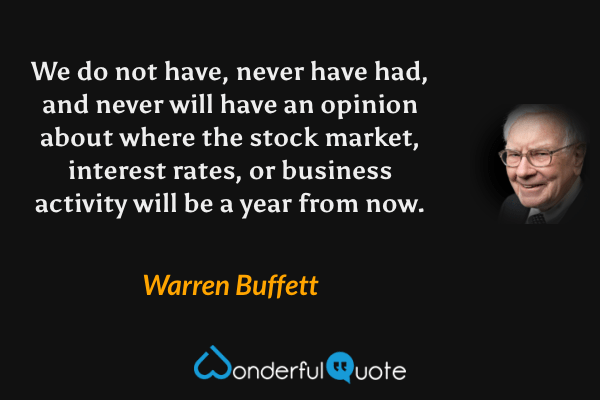
We do not have, never have had, and never will have an opinion about where the stock market, interest rates, or business activity will be a year from now.
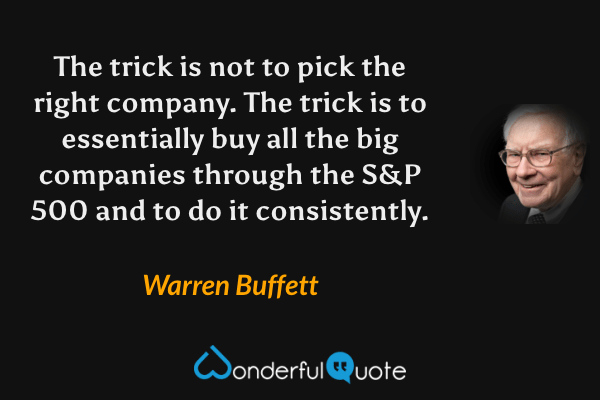
The trick is not to pick the right company. The trick is to essentially buy all the big companies through the S&P 500 and to do it consistently.
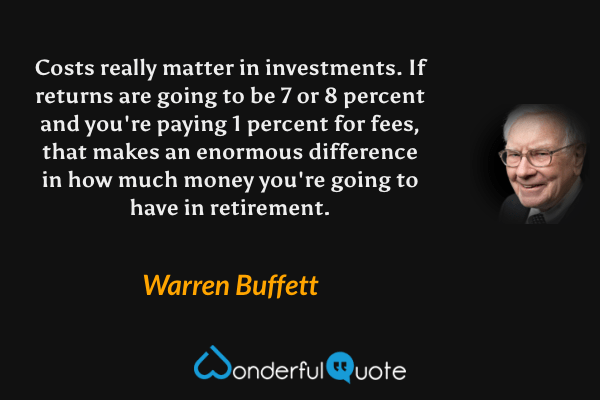
Costs really matter in investments. If returns are going to be 7 or 8 percent and you're paying 1 percent for fees, that makes an enormous difference in how much money you're going to have in retirement.
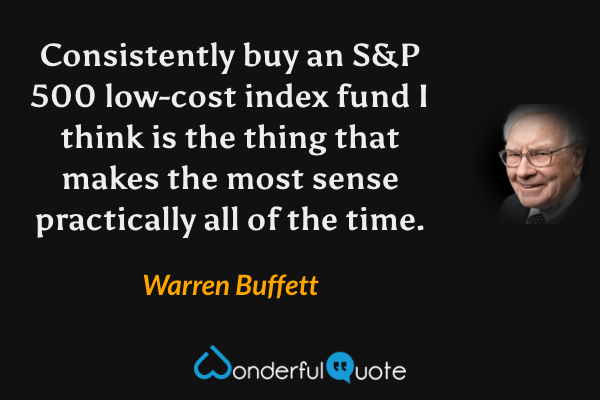
Consistently buy an S&P 500 low-cost index fund I think is the thing that makes the most sense practically all of the time.
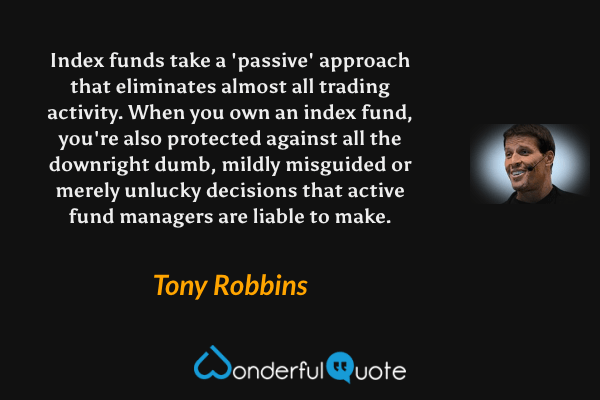
Index funds take a 'passive' approach that eliminates almost all trading activity. When you own an index fund, you're also protected against all the downright dumb, mildly misguided or merely unlucky decisions that active fund managers are liable to make.
The stock market is the story of cycles and of the human behaviour that is responsible for overreactions in both directions.
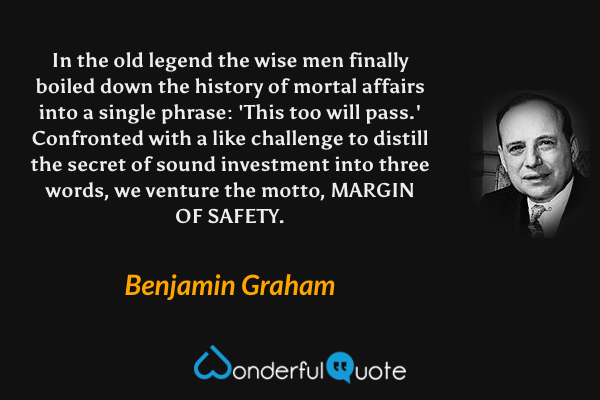
In the old legend the wise men finally boiled down the history of mortal affairs into a single phrase: 'This too will pass.' Confronted with a like challenge to distill the secret of sound investment into three words, we venture the motto, MARGIN OF SAFETY.
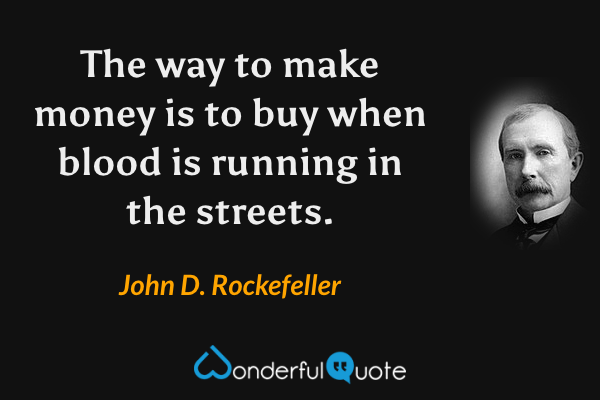
The way to make money is to buy when blood is running in the streets.
Markets are in a constant state of uncertainty and flux and money is to be made by discounting the obvious and betting on the unexpected.
In investing, what is comfortable is rarely profitable.
The stock market's role is to prove the majority of investors wrong.
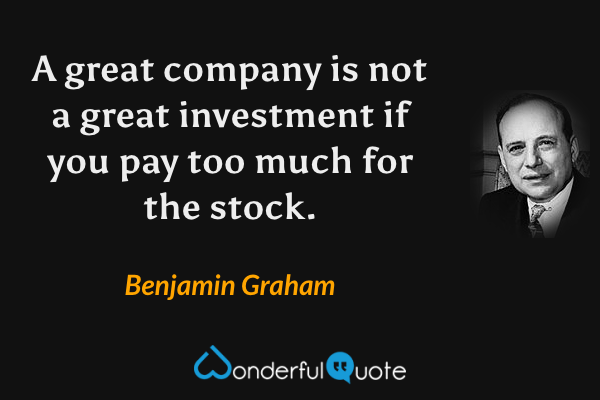
A great company is not a great investment if you pay too much for the stock.
Don't look for the needle in the haystack, just buy the haystack!
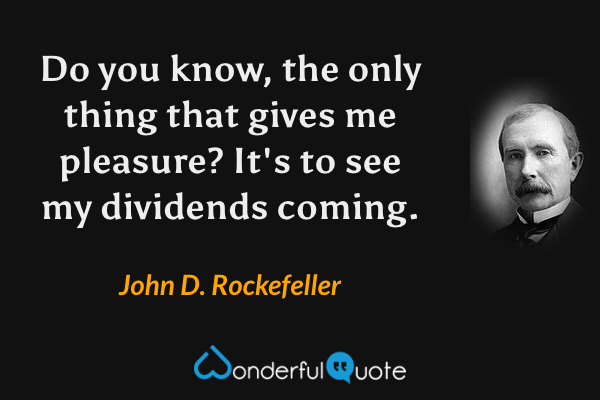
Do you know, the only thing that gives me pleasure? It's to see my dividends coming.
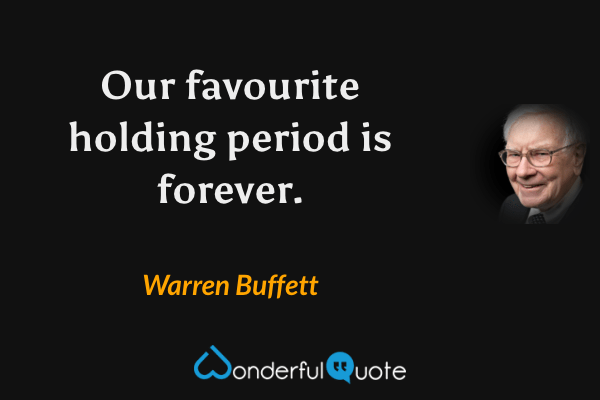
Our favourite holding period is forever.
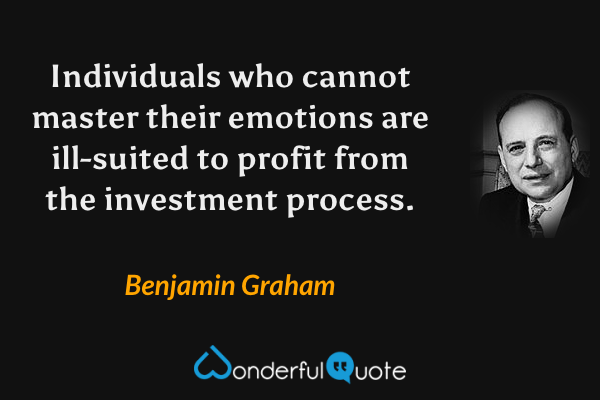
Individuals who cannot master their emotions are ill-suited to profit from the investment process.
There are only two emotions on Wall Street: fear and greed.
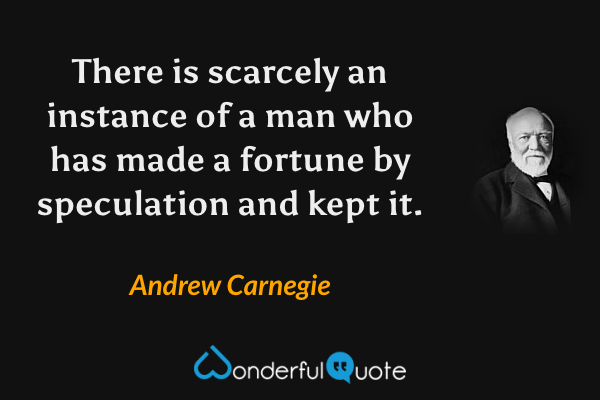
There is scarcely an instance of a man who has made a fortune by speculation and kept it.
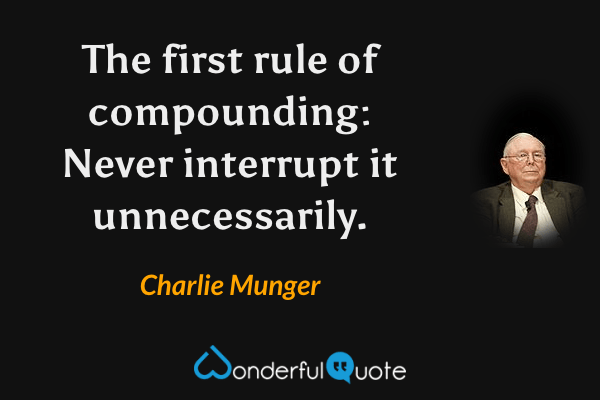
The first rule of compounding: Never interrupt it unnecessarily.
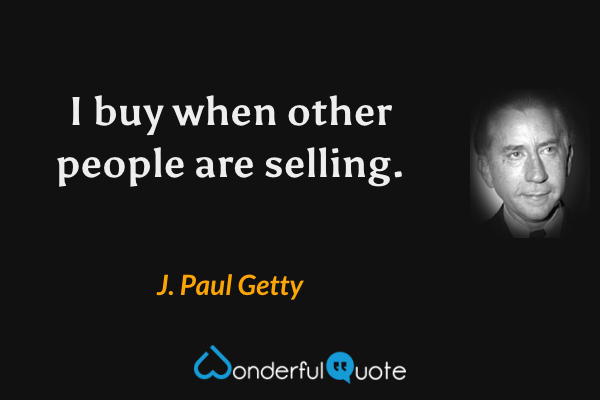
I buy when other people are selling.
Whales only get harpooned when they come to the surface, and turtles can only move forward when they stick their neck out, but investors face risk no matter what they do.
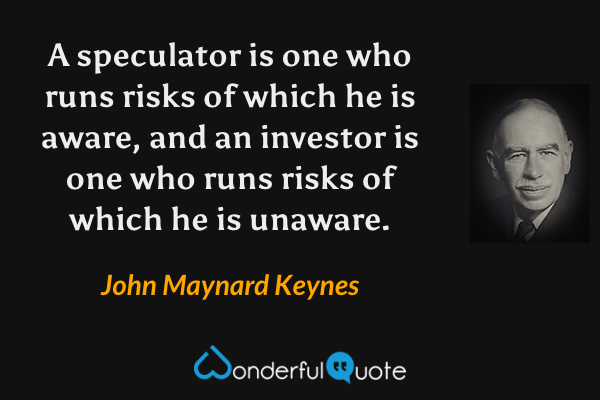
A speculator is one who runs risks of which he is aware, and an investor is one who runs risks of which he is unaware.
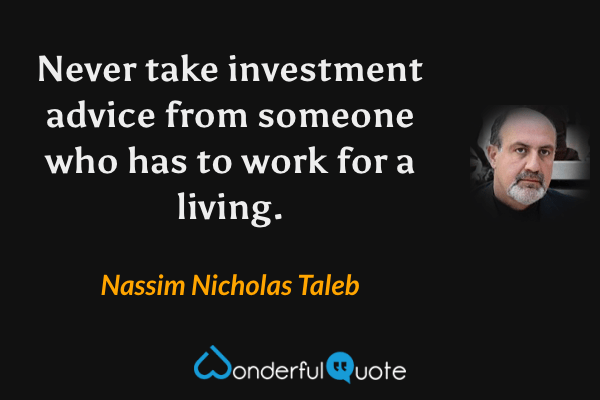
Never take investment advice from someone who has to work for a living.
If you don't find a way to make money while you sleep, you will work until you die.
If you have an investment and don't know how you can lose money on it, don't have that investment.
If you lose some money, it's an exploration. It you lose a bit of money, it's bad luck. If you blow up, it is incompetence. Any unplanned toss is incompetence.
If you need to argue in support of your investment, it's not an investment.
If you must panic, panic early. Be scared when you can, not when you have to.


